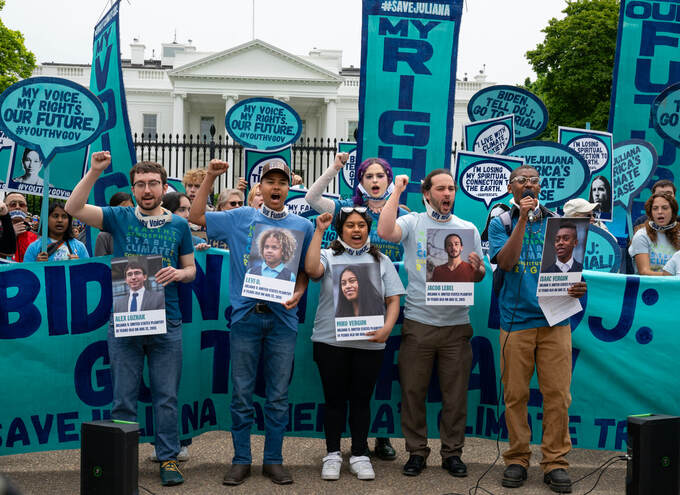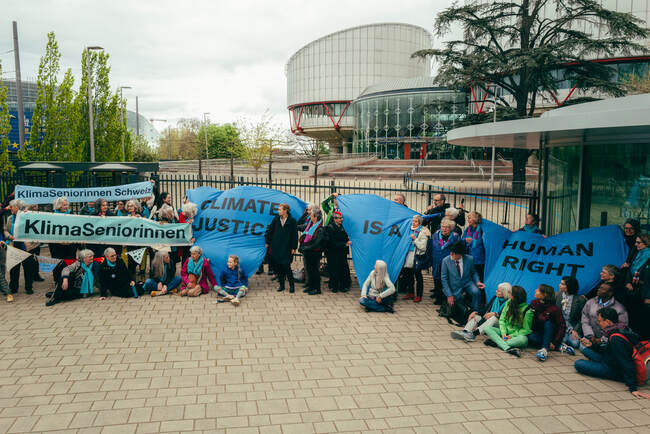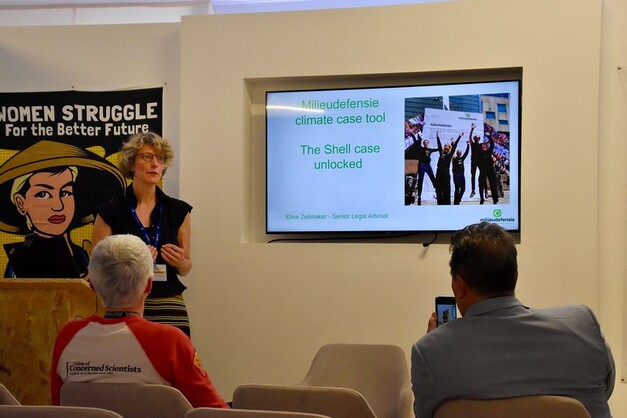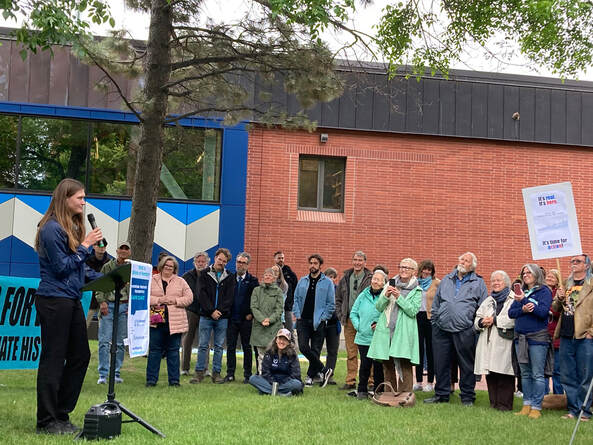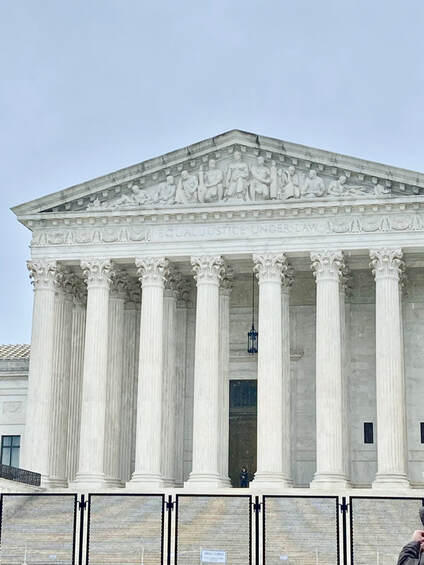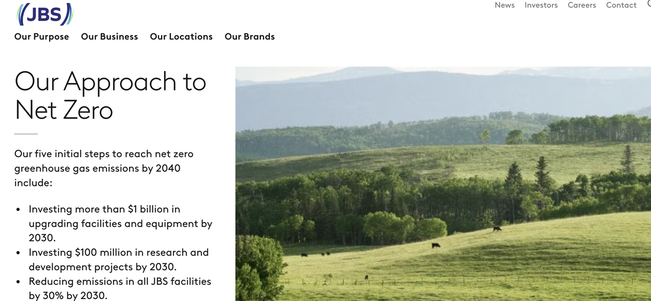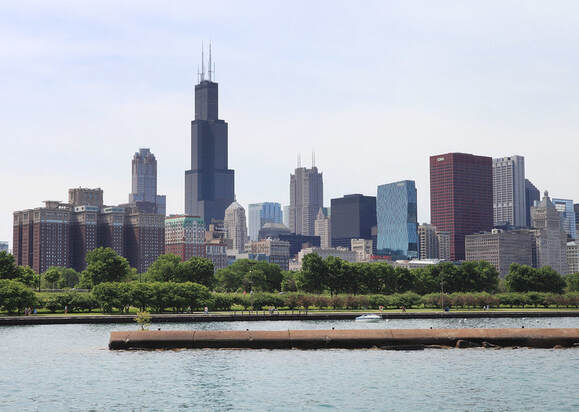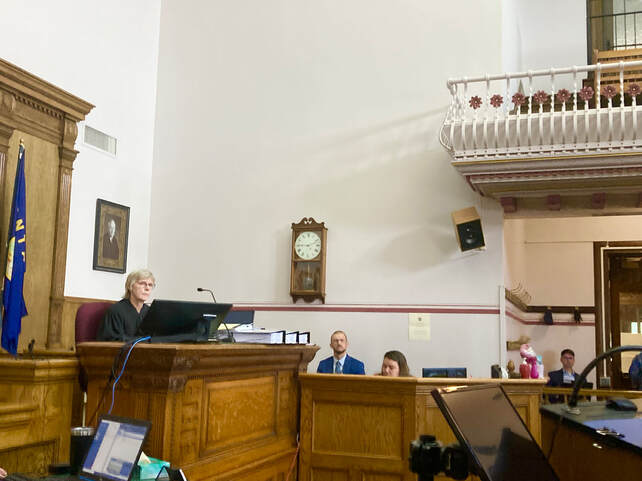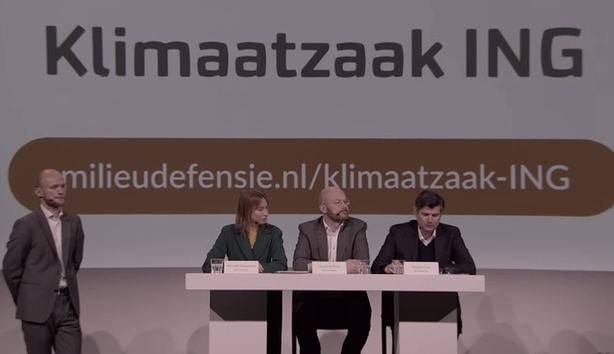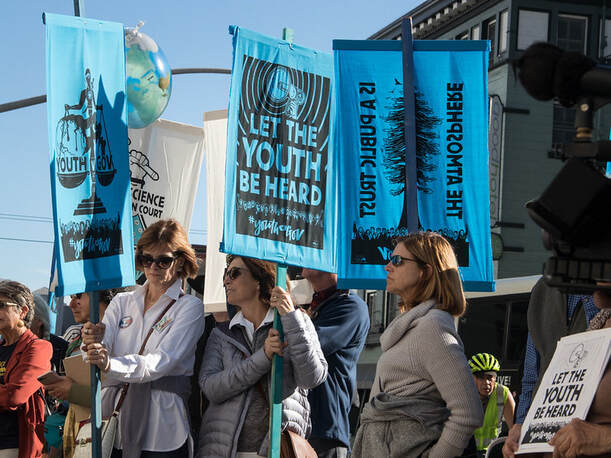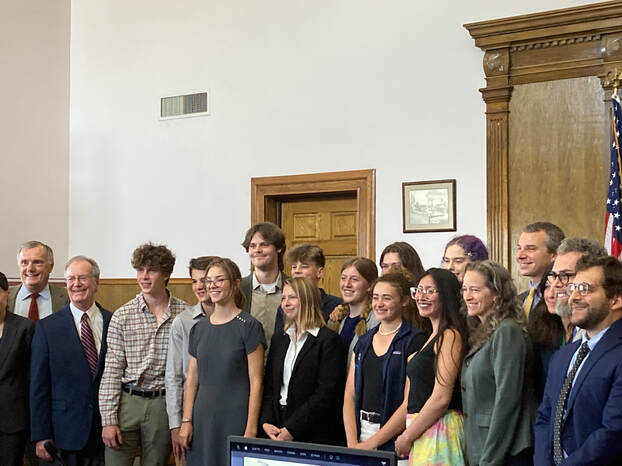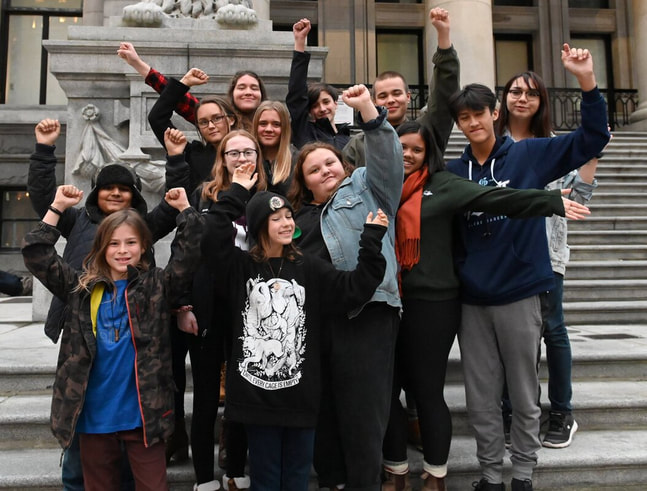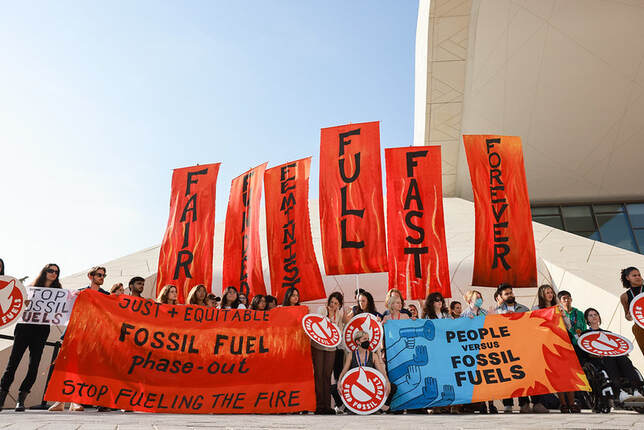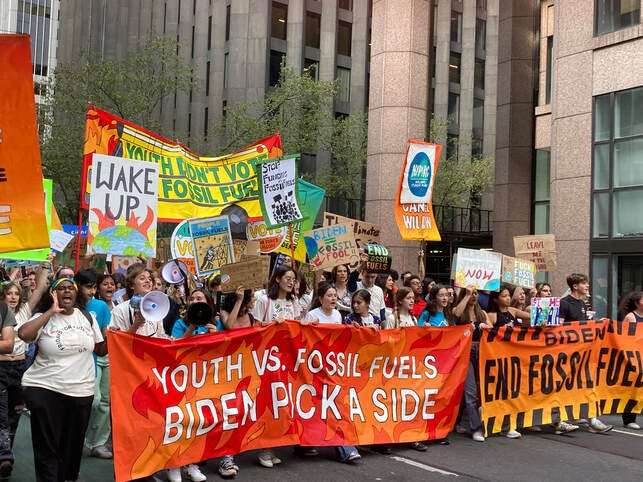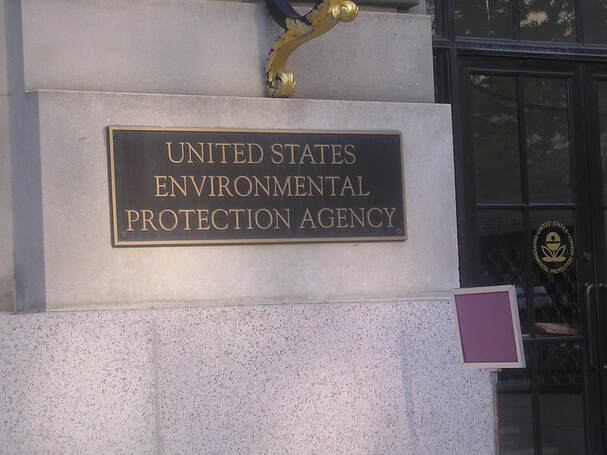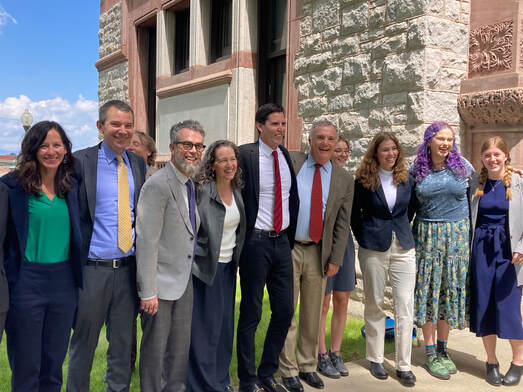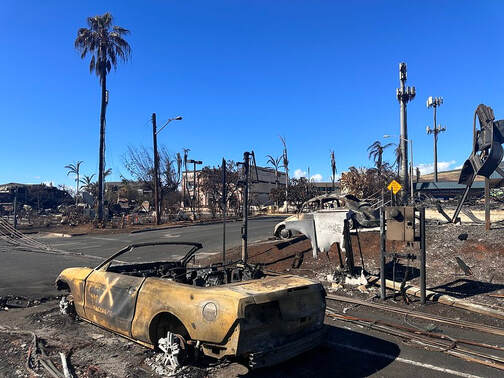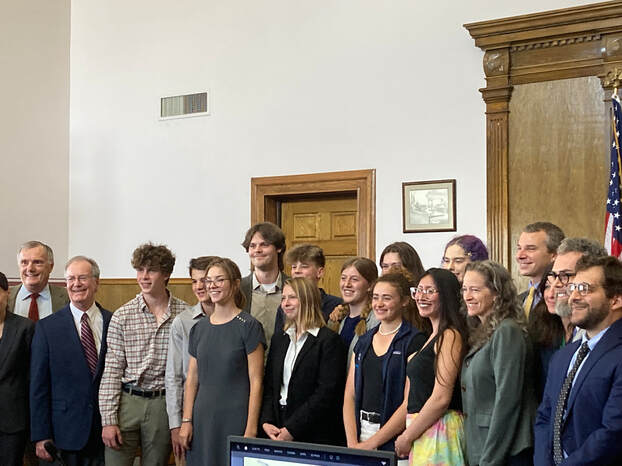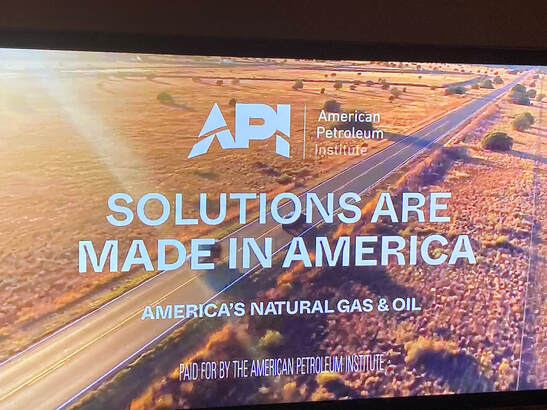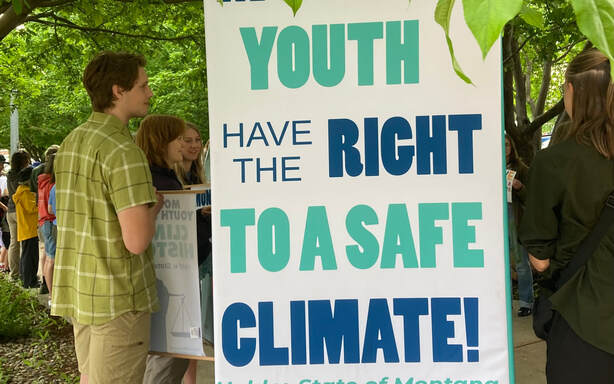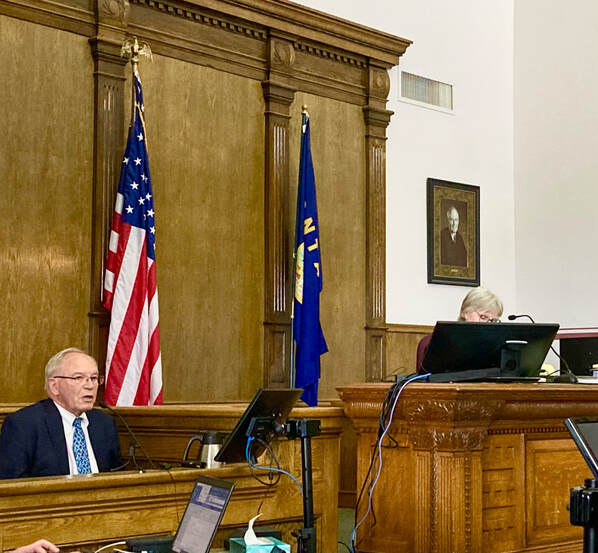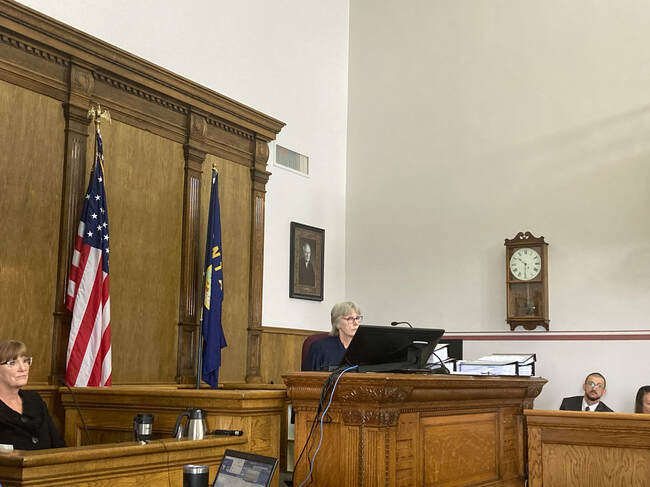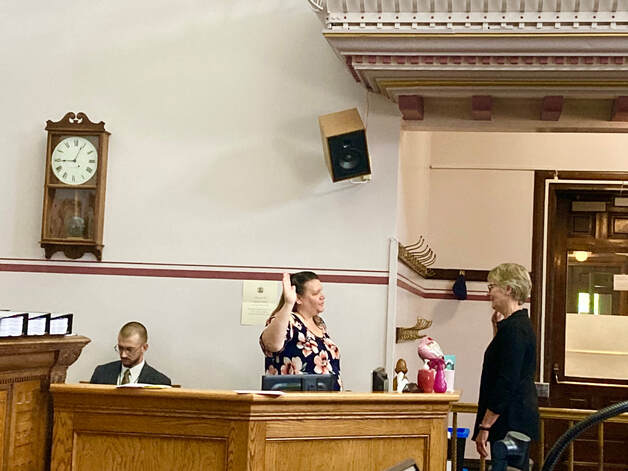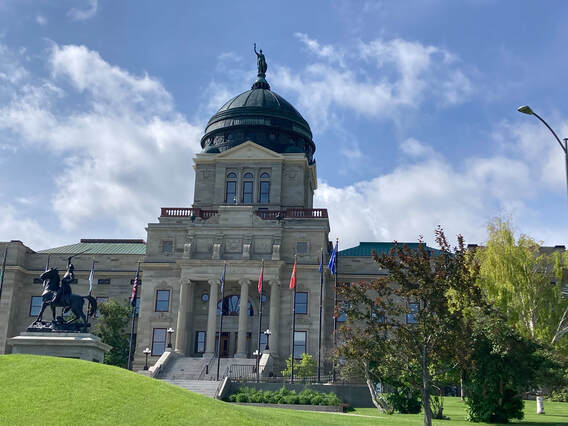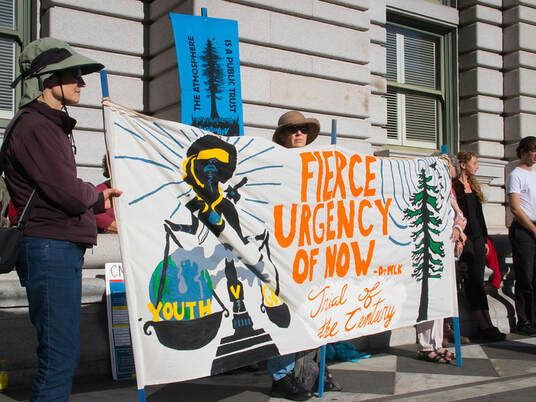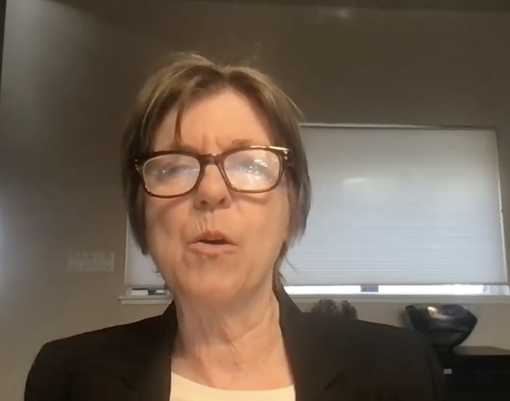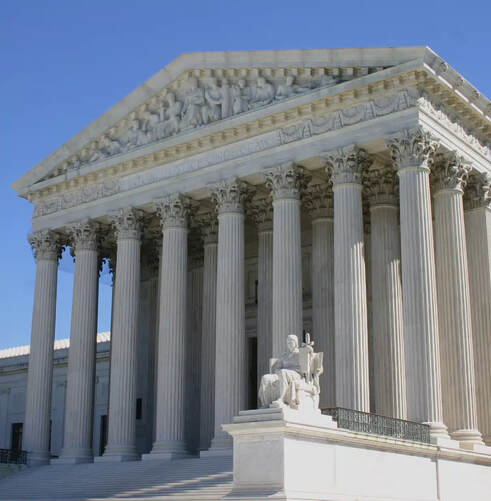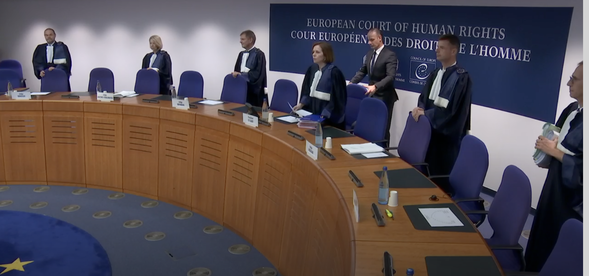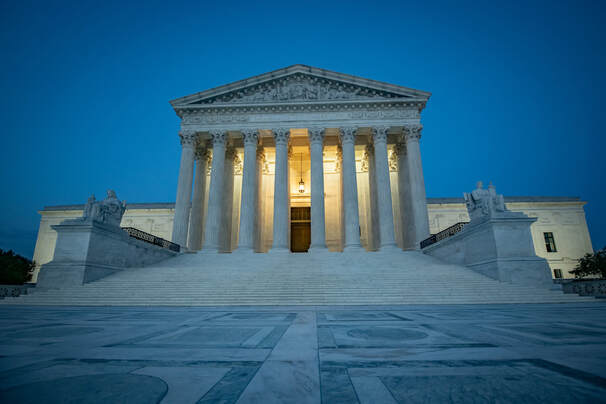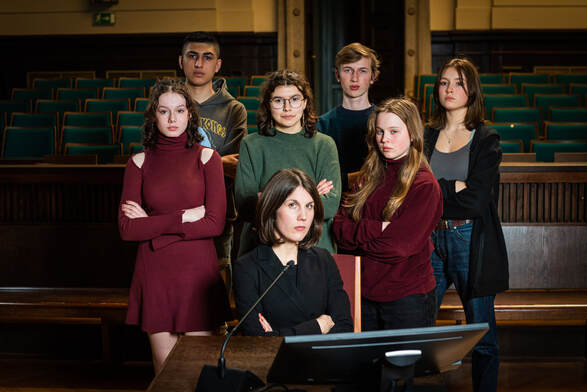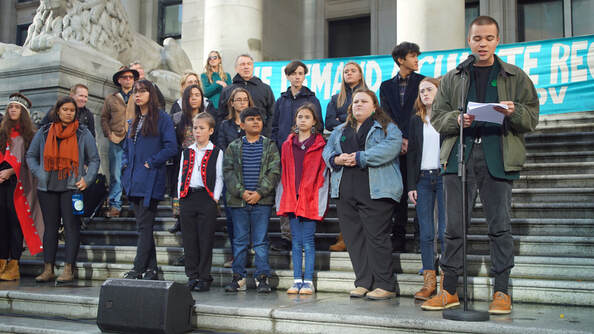A Maryland Judge Has Sided With Oil COmpanies in Dismissing Baltimore's CLimate Liability Lawsuit. What Might it Mean for Other Climate Cases Against Big Oil, and Where Do the Cases Stand?July 17, 2024As major oil and gas corporations like ExxonMobil and Chevron continue to face climate accountability lawsuits brought by US states and communities – with the island territory of Puerto Rico filing the latest such case on July 15 – the industry defendants scored a big win last week when a state court judge in Maryland ruled in their favor and dismissed a climate case filed by the city of Baltimore.
That ruling followed a long string of procedural decisions from federal and state courts over the last several years largely favoring the government plaintiffs in lawsuits seeking to hold large fossil fuel entities liable for damages associated with worsening climate impacts and for allegedly deceiving consumers about the climate consequences of fossil fuels and about the role of the fossil fuel industry in leading solutions to the climate crisis. Coastal communities in California threatened by rising sea levels and severe flooding filed the first suits in this wave of litigation in 2017, and the number of cases filed now amounts to over two dozen. None have yet made it to trial. Nearly all of the cases were filed in state or local courts, and the government plaintiffs have uniformly prevailed in jurisdictional battles where the fossil fuel company defendants have tried to remove the cases to federal courts. One case that was originally filed in federal court by New York City was ultimately dismissed. In a decision issued on July 10 in the case Mayor and City Council of Baltimore v. BP PLC et al., Maryland Circuit Court Judge Videtta Brown referenced the New York City case dismissal, finding it to be persuasive in guiding her ruling. She agreed with the oil company lawyers’ arguments that Baltimore’s legal claims pled under state tort law were preempted by federal law including the Clean Air Act, a statute that authorizes the federal government to control air pollution and greenhouse gas emissions. “Baltimore’s claims cannot survive because they are preempted by federal common law (and the CAA). This court follows the sound reasoning of NYC,” Judge Brown wrote in her opinion. She rejected Baltimore’s framing of its case as strictly about misleading marketing and deceptive behavior on the part of the fossil fuel defendants, writing: “The explanation by Baltimore that it only seeks to address and hold Defendants accountable for a deceptive misinformation campaign is simply a way to get in the back door what they cannot get in the front door.” Judge Brown agreed with the defendants’ argument that the case is an attempt to regulate global greenhouse gas emissions; in her opinion, she states that Baltimore is trying to hold fossil fuel companies liable “for the effects of emissions made around the globe over the past several hundred years.” Baltimore initially filed its lawsuit in July 2018 targeting more than two dozen major fossil fuel companies with claims including nuisance, trespass, product liability claims like failure to warn and design defect, and violation of the Maryland Consumer Protection Act. The city has said it plans to appeal Judge Brown’s decision. Read more Montana Kids' Climate Case Goes Back to Court on AppealJuly 9, 2024What are the arguments on both sides, and what significance and practical impact could the final judgment have?The Montana Supreme Court is set to hear oral arguments on Wednesday in a landmark youth constitutional climate case. The hearing comes as the state seeks to overturn the trial court’s groundbreaking decision last summer that delivered a breakthrough victory to the 16 young Montanans who challenged their government over a policy that prohibited consideration of climate change in environmental reviews, effectively shielding fossil fuel projects from public scrutiny over their contributions to the climate crisis during the permitting process.
Montana district court judge Kathy Seeley found this policy, enacted into law as an amendment to the Montana Environmental Policy Act (MEPA), to be in violation of the state’s constitution that provides the right to a clean and healthful environment. Following a seven-day bench trial in June 2023 – the first climate trial of its kind in the US – she ruled on August 14, 2023 wholly in favor of the youth plaintiffs in Held et al. v. State of Montana. Her ruling struck down that law and a related one restricting judicial relief to litigants challenging state fossil fuel permitting decisions on climate grounds. The ruling also affirmed that the young plaintiffs have a constitutional right to a clean and healthful environment, and recognized for the first time that this right “includes climate as part of the environmental life-support system.” The state defendants, who include Republican Governor Greg Gianforte and several state agencies such as the Department of Environmental Quality (DEQ), promptly appealed the trial court’s ruling. They also requested a stay or a pause on the order taking effect, which Seeley and the state’s Supreme Court both denied. The hearing of the appeal marks another critical juncture for the case, as the Montana Supreme Court will ultimately decide whether or not to uphold the trial court’s decision. Oral arguments before the state’s Supreme Court in Helena are scheduled to start at 9:30am Mountain time on July 10, and a livestream is available here. “An Historic Precedent”? According to Nate Bellinger, a senior attorney with Our Children’s Trust – a nonprofit law firm that represents youth in constitutional climate cases against governments – the Supreme Court will be reviewing the evidentiary trial record upon which Seeley based her decision. That record, he said, is robust and grounded in climate science that the state did not even try to dispute. “We’re optimistic that when the Supreme Court reviews that record, they will come to the same conclusion and affirm the district court’s order,” he said. Read more Supreme Court Invites US Government Input in Honolulu Climate Case as Oil Companies Attempt to Evade TrialJune 10, 2024As climate accountability lawsuits targeting major oil and gas companies in the US continue mounting, the US Supreme Court on Monday issued an order addressing a pair of pending petitions from Big Oil that aim to stop a case filed by Honolulu, Hawaii from advancing to trial. Rather than deny the petitions, the Court is calling on the US Department of Justice to weigh in on the federal preemption arguments raised in the companies’ petitions.
“The Solicitor General is invited to file a brief in these cases expressing the views of the United States,” the Court’s June 10 order states. The order applies to petitions Sunoco LP et al. v. City and County of Honolulu et al. and Shell PLC et al. v. City and County of Honolulu et al., filed in late February by lawyers for oil company defendants in the climate damages and deception case brought by Honolulu in March 2020. The Honolulu case is proceeding to trial in Hawaii state court following an October 31, 2023 ruling from the Hawaii Supreme Court rejecting the companies’ motions to dismiss, in which they mainly argued that federal law supersedes or preempts state law causes of action when it comes to climate change. Honolulu’s case is grounded in traditional state law tort claims such as nuisance, trespass, and failure to warn, alleging that the fossil fuel industry’s longstanding campaign of climate disinformation and deception contributed to substantial and costly climate consequences to the island community. The case seeks to recover damage costs that could amount to billions of dollars, and it is just one of dozens of climate suits filed by communities across the country targeting the fossil fuel industry. These cases, according to the petitions, “present a serious threat” to that industry, and lawyers representing fossil fuel firms urged the nation’s highest court to “put a stop” to this growing litigation threat by taking up their petitions. “The Hawaii Supreme Court’s decision was incorrect, and it provides this Court with the ideal opportunity to address whether the state-law claims asserted in this nationwide litigation are even allowable before the energy industry is threatened with potentially enormous judgments,” one of the petitions argues. Right-wing allies of the fossil fuel industry – including a coalition of Republican attorneys general and former Trump administration attorney general Bill Barr – have amplified calls for the US Supreme Court’s intervention. Groups with ties to the conservative “architect of the Supreme Court” Leonard Leo have been running media and influence campaigns in recent months demanding that the Court take up Honolulu’s case, as recent reporting by Rolling Stone and the Guardian revealed. Read more Youth Take Alaska to Court in Constitutional Challenge to Fossil Gas Mega-ProjectMay 24, 2024Latest youth climate lawsuit targets the Alaska LNG Project, which is expected to generate billions of tons of climate pollutionEight young Alaskans have sued the state of Alaska and a state-created corporation in an attempt to prevent a massive new fossil gas project from proceeding. The lawsuit, Sagoonick v. State of Alaska II, targets the Alaska LNG Project and challenges a state law mandating the project be developed and advanced. This law, the case alleges, violates youth plaintiffs’ due process and public trust rights under the state constitution, as the project’s expected climate pollution would further deteriorate Alaska’s environment and significantly and disproportionately harm the state’s youngest citizens.
“Alaska’s youth are on the frontlines of the climate crisis, and their futures depend on a swift transition away from fossil fuels,” Andrew Welle, senior staff attorney for the nonprofit law firm Our Children’s Trust, said in a statement. “The Alaska LNG Project is the equivalent of pouring gasoline on a five-alarm fire at their homes.” The case was filed May 22 in the state’s Superior Court for the Third Judicial District in Anchorage. Defendants include the state of Alaska, the Alaska Gasline Development Corporation (AGDC), and the company’s president Frank Richards. AGDC, established under Alaskan law in 2010, is a public corporation of the state whose purpose is to facilitate development of fossil gas from Alaska’s North Slope. In 2014 the state legislature passed a law expanding AGDC’s mandate to include development of a liquefied ‘natural’ gas (LNG) project on behalf of the state. These statutory provisions that require the development of a major new LNG project and associated infrastructure are at odds with the scientifically-informed imperative that society must transition swiftly away from all fossil fuels in order to mitigate the worsening climate crisis, the new lawsuit asserts. “At a time when the scientific consensus requires that climate pollution must be rapidly reduced to avert further and irreversible climate harms to Alaska’s youth, [the statutory provisions] unconstitutionally direct AGDC to develop and advance the Alaska LNG Project,” the complaint contends, “which would unleash vast quantities of fossil gas from Alaska’s North Slope and substantially increase Alaska’s emissions of climate pollution.” Read more World "Ocean Court" Issues Groundbreaking Decision Affirming States Must Slash GHG Emissions to Protect Marine EnvironmentMay 21, 2024Countries must step up climate action and take all necessary measures to reduce greenhouse gas emissions in line with the best available science in order to help protect and preserve the marine environment, an international tribunal has determined.
The highly anticipated advisory opinion from the International Tribunal for the Law of the Sea (ITLOS), delivered on May 21 in Hamburg, Germany, marks the first time that an international court has weighed in on the question of states’ responsibilities to combat climate change as a matter of ocean protection. It is the first of three advisory opinions to be issued from international tribunals that are expected to clarify states’ legal obligations to address climate change under international law, which observers say will help inform global climate negotiations under the UNFCCC regime and can provide persuasive authority in climate accountability court proceedings. Developed in response to a request from a coalition of nine small island states, the advisory opinion from ITLOS affirms that climate action is a legal duty; under the UN Convention on the Law of the Sea (UNCLOS) – a legally binding ocean treaty established in 1982 – countries have specific obligations to mitigate ocean pollution and adverse effects on the marine environment from anthropogenic greenhouse gas emissions. Such emissions, including from sources on land or through the atmosphere or at sea, constitute pollution of the marine environment, the tribunal found. This determination gives rise to the obligations to reduce marine pollution stemming from climate change, such as ocean acidification, and for states to work both individually and cooperatively to implement their obligations. Legal experts responded to the advisory opinion highlighting its significance and historic nature. Lea Main-Klingst, a lawyer with UK-based environmental law charity ClientEarth, said that the small island states spearheading the request for the opinion “have succeeded in a world first.” The tribunal’s decision, she said, “has made it clear that states worldwide must reduce their emissions to protect our ocean.” Read more US States and Communities are Suing Big Oil For its Damaging Climate Lies. Will the US Federal Government Follow Suit?May 3, 2024Lawyer who led the federal case against Big Tobacco tells Congress a Justice Department Probe against the petroleum industry is appropriateAs climate change deception lawsuits filed by US states and municipalities against oil and gas majors continue to wind their way through the courts, pressure is building on the federal government to initiate legal action against the fossil fuel industry. This comes as a congressional investigation has unveiled new evidence of what lawmakers say is an ongoing campaign of corporate fraud to delay effective climate action.
“Our investigation uncovered compelling evidence of aggressive industry deceit which continued long after Big Oil gave up on its outright climate denialism,” Rep. Jamie Raskin, a Democrat from Maryland and Ranking Member of the House Committee on Oversight and Accountability, said during a Senate Budget Committee hearing on Wednesday, May 1. “Fossil fuel companies publicly claim to be partners — if not leaders — in fashioning climate solutions, but our investigation exposed that as a fraud. Big Oil is not addressing the climate crisis, but profiting from it, and using a lot of its mammoth resources on continuing campaigns to insulate its carbon-based business model.” Raskin and Senate Budget Committee Chairman Sheldon Whitehouse (D-RI) used the hearing to highlight findings based on subpoenaed industry documents obtained during a three-year investigation launched by House Democrats examining Big Oil’s sordid strategies to pollute the public discourse and impede the energy transition. From sponsoring academic research supporting its preferred purported climate solutions to engaging in extensive greenwashing through ad and PR blitzes, the industry continues to mislead the public on climate and is lying about its commitment to addressing it, internal documents indicate. “Just as it was the case with the tobacco industry, the petroleum companies’ internal documents tell the story,” Sharon Eubanks, an attorney who led the US Justice Department’s successful civil lawsuit against Big Tobacco, said during the hearing. She testified about the striking similarities between Big Tobacco and Big Oil in their deception campaigns and emphasized that oil companies should be held legally liable just as cigarette companies ultimately were. Read more Court Grants US Government's Request to Terminate Juliana v. US Youth Climate CaseMay 1, 2024A three-judge panel of a federal appeals court has shut down a rights-based climate lawsuit brought by 21 young people against the US federal government before the case could get to trial. With the court’s order this time, it appears the landmark case could be permanently ended.
The Ninth Circuit Court of Appeals on Wednesday ordered the Juliana v. United States youth civil rights lawsuit be dismissed once and for all without exceptions. In its ruling, the court granted a petition from the US Department of Justice, representing the government defendants, to supersede the trial court’s authority through an extraordinarily rare legal maneuver called a writ of mandamus. The government’s petition, filed in February, sought to reverse a decision from US District Judge Ann Aiken last year that greenlighted a revised and narrower version of the case for trial. Originally filed in 2015, the Juliana case challenged the US government’s systemic policies and actions that perpetuate fossil fuels and exacerbate the climate crisis. Arguing that the government knowingly endangers the nation’s children through its actions that contribute to climate change, the 21 youth plaintiffs asserted violations of their fundamental rights under the US Constitution and contended that a stable climate system is a precondition for guaranteeing those rights. Judge Aiken concurred when she wrote in a 2016 opinion denying the government’s first attempt to toss the case: “Exercising my ‘reasoned judgment,’ I have no doubt that the right to a climate system capable of sustaining human life is fundamental to a free and ordered society.” Read more Youth Climate Plaintiffs Rally Outside the White House Demanding US Government Face Trial in Juliana v. USApril 21, 2024On the eve of Earth Day, young climate activists who are taking governments to court over the climate crisis in the US assembled in front of the White House in Washington DC to send a clear message to US President Joe Biden and his administration’s Department of Justice: “We will not be silenced!”
Several of the youth plaintiffs from the landmark constitutional climate case Juliana v. United States came together with youth plaintiffs in other US rights-based climate lawsuits, including the Held v. State of Montana case that won a historic victory last year, to demand that President Biden allow the Juliana case to proceed to trial. The case has faced unprecedented attempts by government lawyers in the US Department of Justice to terminate it and prevent any evidence and testimony from being heard at trial, and DOJ under the Biden administration is continuing this relentless obstruction that some legal experts say is an abuse of power. In February the DOJ filed an extreme emergency petition called a writ of mandamus to the Ninth Circuit Court of Appeals – its seventh such petition in this case over the past nine years – in a last-ditch effort to bypass the normal course of civil litigation procedure and avoid facing evidence and real accountability at trial. In response, the 21 Juliana plaintiffs, their attorneys, and supporters are amplifying calls to let “America’s climate case” go to trial and let youth voices be heard in open court. Sunday’s rally was a key demonstration of that, along with more than 70,000 emails sent to President Biden and his administration in recent weeks and petitions with over 300,000 signatures delivered to the White House and Department of Justice. At the start of the “Save Juliana” rally, youth plaintiffs from Juliana and several other climate cases, all spearheaded by the Oregon-based nonprofit law firm Our Children’s Trust, stood behind a giant banner and donned cloth gags to protest their attempted silencing by the US government. “For almost nine years, the Juliana plaintiffs have tirelessly fought to have their day in court. They have endured extreme legal tactics from across three presidential administrations aimed at silencing their voices and preventing their case from being heard at trial,” Mat dos Santos, co-executive director of Our Children’s Trust, said during the demonstration. “No other case in the history of this country has faced this level of government persecution. And out of the more than 40,000 cases in front of the DOJ, these extreme legal tactics have been used in only one case – Juliana v. United States,” said Isaac Vergun, one of several Juliana plaintiffs who took part in Sunday’s rally. “Lives are at stake here. Futures are at stake here. And the government continues to try to stop our case from being heard. I am outraged, and you should be too!” Vergun, speaking out on his 22nd birthday, said he will “continue to fight for my future and the future of all generations.” Read more Industry Allies Amplify Big Oil's Demand for US Supreme Court to End Climate Accountability LawsuitsApril 15, 2024These Fossil Fuel Friends - Including a former US Attorney General - are Fighting Against Climate Cases in US Courts
Climate activists stage a demonstration targeting the US Chamber of Commerce during a Power Shift rally in Washington DC in 2011. The US Chamber has worked for decades to obstruct climate policies and it aids major oil and gas companies try to evade accountability in the courts. Credit: Linh Do via Flickr, CC BY 2.0 DEED.
Oil and gas industry trade associations, corporate-backed legal organizations, Republican attorneys general and other fossil fuel industry allies recently filed court briefs supporting Big Oil’s latest bid to have the US Supreme Court quash climate accountability lawsuits targeting the industry. The submission of these briefs comes as oil company defendants, facing the threat of standing trial and potentially paying significant sums in damage awards, petition the US’s highest federal court to reverse a ruling last fall from the Hawaii Supreme Court allowing Honolulu’s climate suit to proceed to trial.
Honolulu’s case is among more than two dozen lawsuits brought by cities, counties, and states seeking to hold powerful fossil fuel entities accountable for climate harms caused by their products, and for disseminating climate denial and disinformation that ultimately magnified these harms by delaying the transition away from fossil fuels. Many of the cases have overcome initial procedural wrangling, and new suits continue to be filed – the latest one from Bucks County, Pennsylvania came just last month, a few weeks after oil companies submitted their petition explicitly calling on the US Supreme Court to “put a stop to” this barrage of lawsuits. Industry allies are now amplifying this call through the filing of friend-of-the-court or “amicus” briefs. While it is not the first time that fossil fuel defendants and their backers have lobbied the US Supreme Court to intervene in the pre-trial stages of these cases, the stakes are even higher now, they say, as several of the cases including Honolulu’s start moving towards trial in earnest. In no uncertain terms, fossil fuel company lawyers say this litigation poses “a serious threat” to the industry. Echoing this sentiment, a coalition of Republican state attorneys general say in their brief that this “grave threat” warrants the Supreme Court stepping in. Who Are These Big Oil Backers? These 20 Republican AGs are all members of the Republican Attorneys General Association (RAGA), which takes money from and has deep ties to the fossil fuel industry. As HEATED explains in an excellent new piece, the state AG brief is part of a larger project, an “organized effort by the fossil fuel industry to kill all formal efforts to hold corporations accountable for the climate crisis—both in the litigation space, and beyond.” In addition to the AGs, amici backing Big Oil’s petition include oil and gas industry trade associations – the American Petroleum Institute, Western States Petroleum Association, Texas Oil & Gas Association, and the American Exploration & Production Council; big business and “free market” lobby organizations – the US Chamber of Commerce, the National Association of Manufacturers, and the American Free Enterprise Chamber of Commerce; corporate-supported legal foundations – the Atlantic Legal Foundation, the Washington Legal Foundation, and the American Tort Reform Association; a pair of retired US military officers; and two law professors affiliated with the Hoover Institution - a public policy think tank funded by conservative and corporate donors. The US Chamber of Commerce and the National Association of Manufacturers say they represent thousands of American businesses and manufacturers of all sizes across every sector, and though their membership lists are not made public, watchdog sources document their financial ties to and advocacy for major corporate entities – several of whom are defendants in climate accountability lawsuits. The US Chamber has received at least $3 million from ExxonMobil and at least $100,000 from the American Petroleum Institute, while NAM took in $1,163,650 from API (as of 2008). Both industry lobby groups were members of the Global Climate Coalition, a corporate lobby organization (ran out of NAM headquarters) that worked throughout the 1990s to sow climate denial and doubt and obstruct climate action. According to Honolulu’s complaint, the GCC “funded deceptive advertising campaigns and distributed misleading material to generate public uncertainty around the climate debate, with the specific purpose of preventing U.S. adoption of the Kyoto Protocol.” The American Free Enterprise Chamber of Commerce is a newer entity, formed in 2022, and runs a project headed by former Trump administration Attorney General Bill Barr called the Center for Legal Action, which defends or advocates for corporate interests like oil and gas majors in the courts. The AFECC filed an amicus brief in September 2023 backing fossil fuel companies’ petition to the US Supreme Court in Minnesota’s climate accountability case; that petition sought to reverse the 8th Circuit Appeals Court’s ruling that the case could proceed in state court, and the Supreme Court in January declined to review the ruling. Barr is one of the lead lawyers behind AFECC’s amicus briefs, and as Lisa Graves, founder and executive director of investigative watchdog group True North Research explained, he has a longstanding record of representing the interests of big business. “The fact is Barr has been a hired gun for industry for much of his career, and when he wasn’t playing hired gun for industry, he was hired gun for Trump,” she said. The American Tort Reform Association says it is a “broad-based coalition of businesses, corporations, municipalities, associations, and professional firms” working for civil justice reform, though watchdog sources explain that its main purpose is protecting corporate interests from liability and restricting access to justice for people and communities. According to the Center for Justice and Democracy at New York Law School, ATRA’s members “have included representatives of the tobacco, insurance, chemical, auto and pharmaceutical industries,” all with a “direct financial stake in restricting lawsuits.” And as Graves said, ATRA “has acted in diametric opposition to the right of the American people to hold corporations accountable, both for direct civil damages and for punitive damages, for intentional and deliberate destruction or harm.” Read more Historic Ruling Issued by European Human Rights Court in Climate CaseApril 9, 2024Switzerland's Insufficient Climate Mitigation Measures Violate European Convention on Human Rights, Court FindsA regional human rights court in Europe ruled today for the first time in its 65-year history that the climate crisis is a serious threat to human rights, finding that the Swiss government’s insufficient measures to address climate change constitute violations of the European Convention on Human Rights. The historic verdict is a win for citizens seeking to hold their governments accountable through the courts for inadequate climate action, and it could have ripple effects across Europe and beyond in influencing other rights-based climate cases, experts say.
The European Court of Human Rights delivered the verdict in a public hearing on Tuesday, April 9. The Court also issued decisions in two other climate cases during that session - including cases brought by six Portuguese youths against 32 European countries and by a former mayor of a French coastal village – deciding against these applicants on procedural grounds. The ruling in the case against Switzerland, brought by a group of older Swiss women (ages 64+) who are particularly vulnerable to adverse health impacts from extreme heat events, established that protection from climate-related harms is a legal obligation of European states under Article 8 of the European Convention of Human Rights. The Court found that Article 8 (right to private and family life) includes protection from “serious adverse effects of climate change on lives, health, well-being and quality of life,” and that Switzerland’s current climate policies fall short of ensuring this protection for its citizenry. Additionally, the Court ruled that the Swiss senior women were not granted their right to a fair trial in Switzerland’s domestic courts, which had tossed out the case without considering the arguments on their merits. That denial of a fair hearing violates Article 6 (Section 1) of the Convention, the Court found. Initially filed in 2016 by an association called Swiss Senior Women for Climate Protection, the case Verein KlimaSeniorinnen Schweiz and Others v. Switzerland applied to the European Court of Human Rights in Strasbourg, France for consideration in 2020 following exhaustion of domestic remedies with a rejection that year by the Swiss Supreme Court. The human rights court fast-tracked the case, with a hearing before the Grand Chamber held on March 29, 2023. Read more These Next Two Weeks are Big for Climate Accountability Through the Courts in EuropeApril 1, 2024Efforts to hold major corporations and governments accountable through the courts for policies and actions that fuel the climate crisis are on the rise around the world, and especially so in Europe. This week and next will see critical developments in European climate accountability litigation.
Hearings on the appeal of the landmark 2021 verdict in Milieudefensie et al. v. Royal Dutch Shell, in which a Dutch court ruled that the oil and gas major Shell must reduce CO2 emissions across its entire supply chain by a net 45% by 2030 in line with the goals of the Paris Climate Agreement, start this week in The Hague, Netherlands. Since that May 2021 ruling – the first of its kind in the world against a fossil fuel behemoth – Shell has moved its headquarters to the UK and dropped “Royal Dutch” from its name; it has also appealed the verdict, and the Dutch climate campaigners that brought the lawsuit say Shell is flagrantly disregarding its court-mandated emissions reduction obligation. The appeal is a key opportunity for them to urge the courts to enforce the 2021 verdict, particularly in light of the latest climate science and expert analyses warning that society and major oil and gas producers are way off track to meeting international climate targets. “The scientific basis on which we’ve founded our claims against Shell has only solidified. In court, it’s facts that matter, which is why I am confident that we can once again convince the judges that Shell needs to act in line with international climate agreements,” Roger Cox, lawyer for Milieudefensie (Friends of the Earth Netherlands), said in a statement. The Shell case builds upon the historic Urgenda climate case against the Dutch state, where the courts determined that the Netherlands must reduce its greenhouse gas emissions by at least 25% by 2020. It was the first climate lawsuit in the world to establish that a national government has a legal duty to protect human rights by taking more ambitious climate action to mitigate serious climate harms. The Urgenda case has inspired a wave of rights-based climate lawsuits against governments throughout Europe (and beyond), and now a regional human rights court is set to deliver highly-anticipated decisions in a trio of climate cases that could have major ramifications for European climate policies. Next week on Tuesday, April 9, the European Court of Human Rights will hand down rulings in three climate lawsuits heard by the Court’s Grand Chamber last year. The cases, brought by Portuguese youths, an association of elder Swiss women, and by a French citizen and former mayor of a coastal village, all challenge government climate policies as insufficient to protect citizens’ human rights against the ravages of the unfolding climate emergency. Read more Pennsylvania County Takes on Big Oil as Climate Deception Cases Continue MountingMarch 27, 2024A county in southeastern Pennsylvania just north of Philadelphia filed a climate accountability lawsuit on Monday against a handful of major oil and gas companies and their chief trade association, seeking to hold them liable for rising costs associated with recovering from and preparing for increasingly severe climate impacts such as extreme heat and intense storms and flooding.
“In recent years Bucks County has faced unprecedented weather events that have repeatedly put both our residents and our first responders at risk,” Diane Ellis-Marseglia, chair of the board of commissioners for Bucks County, Pennsylvania, said during a news conference announcing the new lawsuit, which accuses fossil fuel entities of lying about the climate consequences of their products to inflate sales and profits at the expense of communities now grappling with worsening climate disasters. Bucks County is the first community in Pennsylvania to sue Big Oil over alleged climate deception. With the filing, the county joins more than three dozen municipalities and states across the US that are turning to the courts in attempts to hold fossil fuel companies accountable for their role in driving climate breakdown, particularly for historical and ongoing deceptive conduct that has stymied meaningful climate action and delayed the transition away from planet-warming fossil fuels. The county’s lawsuit, filed March 25 in the Court of Common Pleas for Bucks County, brings state tort claims of public and private nuisance, trespass, strict liability, negligent product liability and negligence, and civil conspiracy. Named defendants include BP, Chevron, ConocoPhillips, ExxonMobil, Shell, Phillips 66, and the American Petroleum Institute. Read more Youth and Their Attorneys Push Back on Government Attempts to Avoid Accountability in US Climate LawsuitsMarch 25, 2024Attorneys representing young Americans in two separate constitutional climate lawsuits - one at the state level in Montana and the other against the federal government - have filed response briefs as government defendants in each case seek to evade accountability through the courts for policies and actions that exacerbate dangerous climate change.
In the Montana case, a trial court judge delivered a “historic” verdict last August in favor of the 16 youth plaintiffs suing their state government, finding a state policy that prohibits evaluation of greenhouse gas emissions and climate change in environmental reviews required during the permitting process to be unconstitutional. That ruling followed a landmark seven-day trial in June that saw climate scientists, medical professionals and other experts testify along with the youth plaintiffs, providing the court with clear and compelling evidence tying government-authorized climate pollution to harm to Montana’s environment and its young citizens. It was the first-ever trial in US history in a climate case brought by youth on constitutional grounds, and the judge’s verdict notably recognized that the right to a clean and healthful environment guaranteed under Montana’s constitution includes climate. The state defendants have appealed the ruling, currently pending before the Montana Supreme Court. In its challenge of the trial court’s verdict, the state does not refute the underlying facts of the case or does not even directly argue that the judge was wrong in finding the state’s policy unconstitutional. Instead, the state asserts the judge should not have been allowed to decide the case in the first place. In the federal case, Juliana et al. v. United States, the 21 youth plaintiffs are fighting what their attorneys say is an “unprecedented” attempt by the government defendants to silence them and prevent their testimony and evidence from ever being heard at trial. This case challenges systemic government conduct that contributes to dangerous levels of GHG emissions and worsens the climate crisis, and last year a trial court judge in Oregon ruled that an amended and narrower version of the case could proceed to trial. But government defendants have turned to an appeals court in a last-ditch effort to quash the case before trial, using an extreme procedural maneuver called a “writ or mandamus” to bypass the standard course of litigation, including trial and subsequent appeals. This is the seventh time overall that the government has resorted to this tactic in this case, setting it apart from all other cases in which the US government is a defendant. Youth plaintiffs’ attorneys and other legal experts backing them say this behavior is an “abuse of power.” Our Children’s Trust, an Oregon-based nonprofit law firm representing young people in constitutional climate litigation, is now pushing back against government defendants’ attempts to reverse the trial court decision in the Montana case, and to avoid trial at all costs in the federal Juliana case. Read more "Landmark Victory in the Fight Against Greenwashing": Dutch Airline KLM's Sustainability Ad Claims are Misleading, Court RulesMarch 20, 2024A court in the Netherlands handed down what environmental campaigners say is a “historic” verdict today against Dutch airline KLM, finding the company’s sustainability claims in its advertising – including its professed commitment to the goals of the Paris Climate Agreement – to be misleading and in violation of EU consumer law. The ruling sets a “major legal precedent with ramifications across the international aviation sector and for all companies advertising their commitment to the Paris Agreement,” according to UK-based environmental law organization ClientEarth, which represented Dutch climate groups Fossielvrij and Reclame Fossielvrij in their landmark greenwashing lawsuit against KLM.
“Companies that publicly advertise commitments to the goals of the Paris Agreement on climate must now ensure that those claims are feasible and concrete, or risk losing in Court,” Johnny White, an attorney with ClientEarth, said in a statement. “This judgment is nothing short of a wake-up call for highly polluting industries and companies that try to sell the image of commitment to the Paris climate goals without having the plans to get there. It leaves the airline industry’s climate PR strategy dead in the water.” Read more Defying Dutch Court Order, Shell Doubles Down on Oil and Gas - ReportMarch 18, 2024Shell continues to expand its oil and gas operations and approve development of new extraction projects in an apparent violation of a 2021 Dutch court ruling requiring the oil major to reduce CO2 emissions across its entire supply chain by 45 percent by 2030, a new report suggests. The report released today by Milieudefensie (Friends of the Earth Netherlands) and Oil Change International comes just two weeks before the scheduled court hearings on Shell’s appeal of the landmark verdict.
That ruling, issued on May 26, 2021 by the District Court in The Hague in a climate lawsuit brought by Milieudefensie, marked the first time in the world that a court had ordered a polluting company to take responsibility for the climate crisis by reducing emissions and aligning its business with the objectives of the Paris Agreement, which aims to limit global temperature rise to well below 2°C - preferably to 1.5°C. Expert reports and analyses, meanwhile, have confirmed that development of new oil and gas fields is incompatible with mitigation scenarios that hold dangerous warming to the 1.5°C limit. In its 2023 update to its Net Zero Roadmap report, the International Energy Agency states that “there is no need for investment in new coal, oil and natural gas” in the pathway that reduces emissions to net zero by 2050. The Intergovernmental Panel on Climate Change warns in its 2023 synthesis report that “projected CO2 emissions from existing fossil fuel infrastructure without additional abatement would exceed the remaining carbon budget for 1.5°C.” The head of the IEA, Fatih Birol, further warns in a 2023 report that the oil and gas industry faces “a moment of truth” in terms of its role in the clean energy transition, noting that this transition requires “much lower demand for oil and gas, which means scaling back oil and gas operations over time – not expanding them.” Yet expanding its extractive operations is precisely what Shell is doing, according to the new report titled Shell vs. the Climate: Expanding oil and gas, fueling the climate crisis. The report finds that Shell has approved the development of at least 20 new oil and gas extraction assets since the May 2021 Dutch court verdict. That is double the number of approved new extraction projects reported in a previous briefing from Milieudefensie and OCI in September 2022. The 20 new projects in total could result in emissions of 753 million metric tons of cumulative CO2 pollution, which is more than fives times the emissions of the Netherlands in 2021, the report notes. Shell approved six new oil and gas projects in 2023 alone. Any new project approvals are at odds with the Paris Agreement, Milieudefensie and OCI argue. “Any expansion of oil and gas goes against the court order for Shell to reduce its carbon dioxide emissions by 45% by 2030,” the organizations state in a press release. Read more Big Oil Urges US Supreme Court to "Put a Stop" to Climate Deception LawsuitsMarch 4, 2024Lawyers representing oil and gas industry defendants in a climate lawsuit brought by the city and county of Honolulu are calling on the US Supreme Court to quash this suit and others targeting the industry as the cases start advancing towards trial. Warning that the industry faces the threat of billions of dollars in damage awards if the litigation proceeds, the industry lawyers argue in a freshly filed petition that the Court “should put a stop to it”, adding that this is likely the Court’s only chance to weigh in on these high stakes climate court cases in the near future.
In a certiorari petition submitted to the Supreme Court of the United States on February 28, the oil companies say the Court should decide “whether the state-law claims asserted in this nationwide litigation are even allowable before the energy industry is threatened with potentially enormous judgments.” Specifically, they are asking the Court to review a recent ruling from the Hawaii Supreme Court affirming that Honolulu’s climate lawsuit could advance towards trial under state tort law. The industry defendants in this case, which include major petroleum producers like Chevron, BP, and ExxonMobil, had argued unsuccessfully that federal law preempts state law in cases they say are about global climate change. Now they want the nation’s highest federal court to decide this question of whether federal law precludes state law claims in climate liability lawsuits. Honolulu’s case is one of more than two dozen cases brought by municipal and state governments against fossil fuel companies alleging the companies lied to consumers and the public about the climate consequences of their products, effectively inflating sales and delaying and obstructing the transition away from fossil fuels. Some of the lawsuits seek to recover damage costs associated with localized climate impacts and adaptation, some seek to hold companies like Exxon liable for alleged consumer fraud, and others take a hybrid cost-recovery and consumer fraud approach. But for the most part the cases are all brought under state law, including tort claims like public nuisance and failure to warn as well as violations of state and local consumer protection statutes. A pair of cases filed by communities in Puerto Rico features federal racketeering charges as well as state law claims. Similar to tobacco and opioid litigation, these climate lawsuits attempt to hold a powerful industry accountable for the harmful effects of its products and for its deceptive conduct. The new Supreme Court petition comes as many of the climate lawsuits have overcome initial procedural hurdles and are starting to address the substantive allegations – the “merits.” As industry lawyers explain in the petition: “Litigation on the merits in these cases is beginning in earnest, with discovery and pretrial proceedings underway in state courts.” Discovery is the pre-trial evidence gathering phase, and in these types of cases about corporate deceit, that involves obtaining internal documents and questioning former and current industry executives and insiders under oath. Read more New York Files Climate Greenwashing Suit Against Beef Giant JBSFebruary 28, 2024The State of New York has filed a climate lawsuit against JBS, the world’s largest beef producer, seeking to hold it accountable for alleged misrepresentations and misleading marketing. The company has engaged in deceptive business practices and fraud through greenwashing claims about the environmental sustainability of its beef products and about its ability to meet its target of reducing greenhouse gas emissions across its supply chain to net zero by 2040, the State’s lawsuit argues.
Industrial agriculture, and especially beef production, is a significant contributor to greenhouse gas emissions that are driving climate breakdown. The world’s five biggest meat and dairy corporations together account for more annual GHG emissions than oil majors like ExxonMobil, Shell and BP do individually, and JBS’s emissions in 2021 were greater than that of Ireland. Yet despite its sizable climate impact, JBS highlights its net zero climate commitment and makes other environmental claims through advertisements and marketing that cater towards environmentally-conscious consumers. According to the New York Attorney General Office, such representations are deceptive and take advantage of consumers’ preference for sustainable products. “When companies falsely advertise their commitment to sustainability, they are misleading consumers and endangering our planet,” New York Attorney General Letitia James said in a statement. “JBS USA’s greenwashing exploits the pocketbooks of everyday Americans and the promise of a healthy planet for future generations. My office will always ensure that companies do not abuse the environment and the trust of hardworking consumers for profit.” The lawsuit was filed on February 28 in the New York County Supreme Court in New York City against JBS USA Food Company – JBS’s American subsidiary – and alleges violations of New York business law for false advertising and deceptive acts or practices and violations of state law pertaining to fraudulent conduct. New York seeks a court order for the company to cease its misleading marketing, and it also seeks civil penalties and disgorgement of profits. Read more Why is the Biden DOJ Blocking a Landmark Youth Climate Suit?February 27, 2024Piece originally published by Drilled
In late December, a federal district court judge in Oregon issued a ruling that put a landmark youth constitutional climate lawsuit against the federal government firmly back on path towards trial. “The judiciary is capable and duty-bound to provide redress for the irreparable harm government fossil fuel production has caused,” US District Judge Ann Aiken wrote in her December 29, 2023 opinion denying the government’s latest bid to toss out the 2015 Juliana v. United States case. The Juliana case contends that by promoting and perpetuating a fossil fuel-based energy system despite full awareness of the catastrophic and irreversible climate consequences, the US federal government has threatened the very ability of youth and future generations to live fully healthy, safe and prosperous lives, denying them the basic rights to “life, liberty and the pursuit of happiness” that every American citizen is supposedly guaranteed. James Gustave Speth, an environmental advocate and expert witness in the Juliana case, documents this pattern of government conduct in his book They Knew, calling it “the greatest dereliction of civic responsibility in the history of the Republic.” Now, it appears questionable whether the 21 young plaintiffs in Juliana, which has been making its way through the courts for 9 years now, will ever get their day in court—despite the current administration’s claims that it is working for climate action. “At every turn the government has fought like heck against these young people,” said James May, an environmental law professor at Widener University Delaware Law School. Since the Juliana lawsuit was first filed in 2015, the federal government has seemed hell bent on stopping it in its tracks. The US Department of Justice (DOJ) has filed more than a dozen requests to pause proceedings and half a dozen extraordinarily rare emergency petitions. Earlier this month the DOJ submitted yet another mandamus petition to the Ninth Circuit Court, its seventh overall, which legal experts say is unheard of in American civil litigation. “I was a federal public interest litigator for a quarter of a century. I don’t know of anything else ever like it,” May said. Read more Chicago Sues Big Oil Over Climate DeceptionFebruary 20, 2024The city of Chicago filed a climate accountability lawsuit against half a dozen major oil and gas companies and their chief lobbyist group the American Petroleum Institute, charging them with deceptive conduct that resulted in escalating climate-related damages and costs incurred by the city and its residents. Chicago’s lawsuit is the latest from a US jurisdiction to target Big Oil for its alleged climate deception, and comes just five months after the state of California brought a similar climate lawsuit that was hailed as a “watershed moment” in the fight for climate accountability.
Chicago filed its complaint on Tuesday, February 20 in the Circuit Court of Cook County. The complaint alleges causes of action under state tort law, including public nuisance, negligence, and failure to warn as well as civil conspiracy and unjust enrichment and violations of local city laws concerning consumer fraud and misrepresentations relating to sales and advertising. In addition to API, the named defendants are BP, Chevron, ConocoPhillips, ExxonMobil, Phillips 66, and Shell. These companies and API knew more than 50 years ago that burning fossil fuels would have potentially catastrophic consequences for society, yet rather than publicly acknowledging this they doubled down on production and distorted the public’s understanding of climate change to protect profits, the case argues, supported by documented evidence. The petroleum industry funded front groups and campaigns to promote climate denial and block regulatory and policy responses to the looming environmental threat, which has now grown into a full-blown crisis wreaking havoc in communities across the United States and beyond. With its legal filing, Chicago joins more than three dozen jurisdictions in the US that have turned to the courts seeking to hold the oil and gas industry liable for climate change harms. Read more Montana Defendants Claim Trial Judge "Had No Authority" to Rule on Historic Youth Climate CaseFebruary 15, 2024In August 2023, Montana District Court Judge Kathy Seeley issued what has been described as a “landmark” and “historic” win for the sixteen young people who sued their state government over a policy that bans regulators from even considering climate change in routine environmental impact assessments. Following a seven-day trial in June, Seeley determined that Montana had violated its state constitutional guarantee of the right to a clean and healthful environment through this policy that shielded fossil fuel projects from scrutiny over their climate impacts – the first time in U.S. history that a government has been held accountable under constitutional provisions for actions that contribute to the climate crisis.
Now, Montana is urging the state’s highest court to overturn that ruling by arguing that Seeley should never have been allowed to decide on the case in the first place. In their opening brief filed with the Montana Supreme Court on February 12, state defendants in Held et al. v. State of Montana claimed that the district court “had no authority to decide this case” because the youth plaintiffs lacked what is called standing, or the permission to be in court bringing a lawsuit. Specifically, the state argues that the policy at issue in the case did not cause climate change injuries to plaintiffs. It also argues that invalidating the policy would not redress any alleged harm, because scrapping it would not substantially alleviate the global climate crisis. In making these arguments, state defendants say that the ‘causation’ and ‘redressability’ requirements for plaintiffs to have standing have not been met. Read more Norway Aims to Overturn Court Verdict Blocking North Sea Oil FieldsJanuary 31, 2024The Norwegian government is turning to the Court of Appeal seeking to reverse a landmark ruling that invalidated the State’s approvals of three new oil and gas fields in the North Sea on climate grounds. The verdict, delivered by the Oslo District Court on January 18, 2024, halted any further permitting or development of the offshore fields.
That court-imposed order, called an injunction, remains in effect regardless of the government’s attempt to challenge it, according to Frode Pleym, head of Greenpeace Nordic, which brought the climate lawsuit against the State along with Natur og Ungdom (Young Friends of the Earth Norway). The environmental groups successfully argued that the State’s approvals of the new oil fields, called Breidablikk, Yggdrasil, and Tyrving, did not adequately account for their expected contribution to global greenhouse gas emissions as required under Norwegian and EU law. The groups pointed to the Norwegian Supreme Court’s finding in a prior version of this litigation that Norway is obligated to consider the full climate impact of oil and gas projects prior to their approval. That includes the emissions generated when the oil is combusted, even if it happens outside Norway’s borders. In approving the North Sea fields, the government dismissed or downplayed the climate impact, the district court found. Such a deficient environmental assessment violates Article 112 of the Norwegian constitution and the EU Project Directive, according to the verdict. “This is the first win on oil for environmental organisations against the petrostate Norway,” Klimentina Radkova, climate and energy advisor and legal campaigner with Greenpeace Nordic, said via email. “It also creates precedent for other European countries, by way of the Project Directive.” The EU Project Directive mandates that EU member states take climate impacts into consideration in environmental impact assessments. Read more This NGO Won a Climate Case Against Shell. Its Next Target? Dutch Bank INGJanuary 29, 2024Story originally published by DeSmog
When Royal Dutch Shell lost a landmark climate lawsuit in The Netherlands, climate advocates said the Dutch court’s ruling put polluters and their financiers on notice. Now, the Dutch NGO that successfully sued Shell over its climate plans is taking those financial backers to court in a case that could help reverse the global banking sector’s support of fossil fuel firms and their activities. On January 19, Milieudefensie (Friends of the Earth Netherlands) announced it is initiating legal action against ING, the Netherlands’ largest bank and a major funder of U.S. liquefied natural gas (LNG). In a letter addressed to ING CEO Steven van Rijswijk and the first step in litigation, Milieudefensie says it believes the bank is in breach of its “duty of care” obligation under Dutch law. “ING’s climate policy is miles away from what is necessary to achieve the 1.5°C target,” the letter asserts, referring to the Paris Agreement’s more ambitious climate objective. Since that agreement’s adoption in December 2015, ING has issued 83.2 billion euros in bonds to the fossil fuel industry, Milieudefensie says. “We are starting a new lawsuit against ING, the biggest commercial bank in the Netherlands, because it is jeopardizing our future by continuing to finance and support companies that exacerbate the climate crisis,” Milieudefensie campaigner Nine de Pater told DeSmog by email. “As a financial institution, ING has the responsibility to be the banker of our future, not the banker of the climate crisis.” Here, Milieudefensie is taking a similar legal approach as in its winning case against Shell. In May 2021, The Hague District Court in the Netherlands accepted the NGO’s arguments that Dutch law required Shell to align its business with the Paris Agreement objectives under the law’s “duty of care” obligation, and ordered the global oil giant to slash its CO2 emissions 45 percent by 2030. Importantly, the court’s historic ruling, which the corporation is appealing, applies not just to Shell’s direct emissions from extracting fossil fuels around the world, but also to those from using its products. (After the verdict, Royal Dutch Shell moved its headquarters from The Netherlands to the United Kingdom and dropped “Royal Dutch” from its legal name.) Akin to that demand, Milieudefensie now seeks to compel ING to cut its CO2 emissions roughly in half by 2030 and align its policy with the Paris Agreement’s 1.5°C target. The environmental group also wants the bank to stop doing business with polluting companies that fail to demonstrate that they have credible climate plans. That means cutting ties with oil and gas clients expanding fossil fuel production, which scientists say would send the world’s average temperature soaring past Paris climate targets. Read more Two New Climate Cases Launched in the NetherlandsJanuary 19, 2024THE DUTCH NGO THAT SUCCESSFULLY SUED SHELL ANNOUNCES NEW CLIMATE CASE AGAINST FOSSIL FUEL FINANCIER ING, WHILE THE ISLAND OF BONAIRE FILES CLIMATE LAWSUIT AGAINST THE DUTCH STATEThe Netherlands has been a hotspot for climate litigation. In 2015 the Urgenda Foundation along with Dutch citizens won a historic verdict against the Dutch government, marking the first time in the world that a court ordered a government to take more stringent climate mitigation action. The Dutch Supreme Court upheld this ruling in 2019, setting a powerful example indicating that governments have a legal duty to respond more urgently and effectively to the climate crisis in line with their human rights obligations. In 2021 a Dutch court delivered a groundbreaking decision in a climate lawsuit against oil major Shell, implying that this legal duty extends also to (multinational) corporations. Next month a court is expected to issue a decision in a climate case alleging greenwashing by Dutch airline KLM. And so far this month, Dutch citizens and climate campaigners have launched two new legal challenges – one against the government, and one against the country’s largest bank.
On January 19, Friends of the Earth Netherlands (Milieudefensie) announced the initiation of legal action against the Dutch bank ING. In a “notice of liability” letter to ING’s board chair, the first step of litigation, Milieudefensie says the bank has breached its legal duty of care by failing to align its business with the objectives of the Paris Agreement, including by continuing to finance polluting companies that are driving dangerous levels of warming inconsistent with global climate action goals. “ING continues to exacerbate the climate crisis,” Donald Pols, director of Milieudefensie, said at a press conference announcing the group’s plan to take the bank to court. He noted that ING “still partners with and funds companies that start new fossil fuel projects” and that ING has said it would stop funding new oil and gas projects only by 2040 – 15 years too late. According to the letter, ING has self-reported that its financed GHG emissions are 61 megatonnes of CO2-equivalent (in 2022), which is greater than the annual emissions of entire countries like Sweden or Cambodia. And in the years since the Paris Agreement entered into effect, ING has issued more than 83 billion Euros in bonds to the fossil fuel industry. Given this financing going into climate destabilizing companies and activities, Pols says that ING “is the banker of the climate crisis.” His organization is demanding that the bank stop engaging with big polluters if they fail to demonstrate they have credible climate transition plans. Milieudefensie also demands that ING halve its own emissions by 2030 (at least 48% reduction in CO2 and 43% reduction in CO2-e) and ensure its climate plan is fully aligned with the Paris Agreement goal of limiting warming to no more than 1.5 degrees C. Read more Norwegian Court Overturns Norway's APprovals of New Offshore Oil Fields on CLimate GroundsJanuary 18, 2024A court in Norway has delivered a key victory for climate campaigners in the fight against fossil fuel expansion, determining that the Norwegian government’s approvals of three new offshore oil and gas fields violated Norwegian and European law.
The Oslo District Court’s verdict, issued January 18, 2024, is the culmination of a legal challenge launched last year by Greenpeace Nordic and Natur og Ungdom (Young Friends of the Earth Norway) that sought to invalidate the state’s approvals of the Breidablikk, Yggdrasil and Tyrving fields in the North Sea. The environmental groups argued the government’s decision did not adequately account for the fields’ expected contribution to the climate crisis, and were illegal under the Norwegian Constitution, EU law and the UN Convention on the Rights of the Child. Ultimately, the court agreed that the fields’ approvals were unlawful. The court’s verdict renders them invalid and prohibits the government from issuing any new permits to construct and operate the fields. Production from one of the fields, Breidablikk, had already started. “The judgement establishes that the Breidablikk, Yggdrasil and Tyrving oil and gas fields were approved on an illegal basis and that production must be stopped immediately. We expect a halt to all further developments,” Frode Pleym, head of Greenpeace Norway, said in a statement. Read more Ontario Court of Appeals Hears Landmark Youth Climate CaseJanuary 17, 2024The youth climate activists from Ontario, Canada challenging their provincial government’s scaled back climate policy through the courts continue their battle for accountability as their case came before the appellate court this week in a critical hearing.
On January 15, the Ontario Court of Appeal heard oral arguments in the youth climate case Mathur et al. His Majesty in Right of Ontario, which contends that the Ontario government’s relaxed 2030 greenhouse gas emissions reduction target exacerbates grave climate harms in violation of the fundamental rights of youth and future generations under the Canadian Charter of Rights and Freedoms. The lawsuit, brought in 2019 by seven young people from across the province, advanced to a hearing on the merits in September 2022 – the first rights-based climate case in Canada to reach this stage. Despite affirming many of the youth applicants’ points, the Superior Court ruled in April 2023 to dismiss the case, a decision currently being challenged on appeal. “Our fight against Ontario’s inadequate climate targets is undeterred,” 16-year-old applicant Sophia Mathur of Sudbury, Ontario said in a statement. “Heading to the Court of Appeal, we stand resolute, unwavering in our commitment to protect the rights of all and secure a sustainable future for generations to come.” Read more State Court Declines to Toss Out Delaware's Climate Accountability CaseJanuary 9, 2024The state of Delaware’s lawsuit seeking to hold fossil fuel companies liable for alleged climate deception and climate-related costs is one step closer to trial after a state court judge refused to completely dismiss defendants’ bids to toss out the case.
Superior Court Judge Mary M. Johnston issued an opinion on January 9 striking out several elements of the state’s complaint but upholding other allegations, including a claim that the companies failed to warn about the climate consequences associated with their products. "We're grateful that the Court denied several Big Oil defendants' efforts to evade accountability," Mat Marshall, a spokesperson for the Delaware Attorney General Office, said in an emailed statement. "We're reviewing Judge Johnston's opinion and analyzing next steps, and are undeterred in our pursuit of justice for Delawareans enduring the cost of climate change. Delaware’s lawsuit, filed in September 2020, targets more than two dozen oil and gas companies and their chief lobby group the American Petroleum Institute, accusing them of decades of deceitful conduct intended to maximize fossil fuel sales and profits while publicly denying or downplaying the climate risks. This has led to increased fossil fuel combustion and subsequent climate breakdown with severe and costly impacts to the state such as coastal flooding and erosion and extreme heat, the complaint asserts. Delaware also alleges the defendants continue to mislead the public through greenwashing and false advertising. The lawsuit includes claims of negligent failure to warn, nuisance, trespass, and violation of the Delaware Consumer Fraud Act. Read more Youth Climate Case Against US Government Should Go to Trial, Court Rules (AGAIN)January 5, 2024A federal trial court judge in Oregon has rejected the US government’s latest attempts to quash the constitutional climate case Juliana v. United States, once again allowing the youth-led civil rights lawsuit to advance to trial.
In a ruling issued on December 29, 2023, US District Judge Ann Aiken denied the government defendants’ motions to dismiss and to further stall the litigation as well as their request to bring another pre-trail appeal. Aiken’s ruling also orders the parties to arrange a pre-trial conference to discuss next steps including scheduling a trial date. The case had been previously slated to start trial five years ago on October 29, 2018, but the government’s extraordinary and repeated obstruction tactics derailed the trial and ultimately resulted in a federal appeals court ordering the case be dismissed in January 2020. First filed in 2015 by the nonprofit law firm Our Children’s Trust, representing 21 young people from across the country, the lawsuit challenges the US government’s promotion and perpetuation of a fossil fuel-based energy system that is contributing to the climate emergency, which disproportionately burdens youth as climate impacts worsen over time. The government’s conduct is unconstitutional, the case contends, endangering youth plaintiffs’ fundamental rights under the Fifth Amendment to the US Constitution, as well as amounting to reckless destruction of life-sustaining natural resources in violation of the public trust doctrine. While the case had originally sought both a court declaration of these violations and a court order for the government to develop a science-based “climate recovery plan” to help reverse atmospheric carbon dioxide concentrations back down to a limit of 350 parts per million, a Ninth Circuit Court of Appeals panel held that the latter remedy was outside the scope of the courts’ authority to impose. In a 2-1 decision the panel decided the case should be terminated, and it sent the case back to the trial court with instructions to dismiss. But in a June 1, 2023 order Judge Aiken revived the litigation in granting plaintiffs’ request to move forward under a revised version of their complaint, which eliminated the ask for the court to order government action. With the case now seeking only declaratory relief, Aiken noted that the question of determining whether constitutional rights have been violated “is squarely within the purview of the judiciary.” Read more 2023 Has Been A Big Year for Climate Accountability in the CourtsDecember 28, 2023Story originally published by DeSmog
Climate litigation had a momentous year in 2023. Courts worldwide heard evidence and arguments at pivotal trials and hearings. Landmark rulings marked progress in holding governments to account for climate inaction or denial, and new climate cases continued to be filed. With climate lawsuits now totaling nearly 2,500 worldwide, it is clear that courts have become a critical venue for seeking climate justice and accountability. Here are some of this year’s highlights. Major Court Victories United States In a groundbreaking ruling in August, Judge Kathy Seeley of the First Judicial District Court of Montana found in Held v. State of Montana that the state’s ongoing support for and promotion of fossil fuel development — including directing state regulators not to consider a project’s climate impacts during the permitting process — violated Montana’s constitutional guarantee of the right to a clean and healthful environment, which extends to a stable climate. This case, brought by 16 children and teens against their state government in 2020, was the first constitutional climate case in the U.S. to reach trial, as well as a case brought by youth plaintiffs. It was also just the second time that climate scientists have given expert testimony in a trial setting in a U.S. court. Montana — a state known for both its natural splendor, and its coal mines and oil and gas operations — had no answer to the robust scientific evidence presented to the court. The scientists who testified on the plaintiffs’ side included experts such as award-winning climate scientist Steven Running, who has contributed to Intergovernmental Panel on Climate Change reports; ecologist Daniel Fagre, an expert on Montana’s Glacier National Park; and Mark Z. Jacobson, a world-leading expert on renewable energy and the energy transition. Legal experts say this ruling could have broad implications. “It may provide something of a roadmap for future cases,” Jennifer Rushlow, dean of the Maverick Lloyd School for the Environment, professor of law, and faculty director of the Environmental Law Center at Vermont Law School, told DeSmog. According to Delta Merner, lead scientist at the Union of Concerned Scientists’ Science Hub for Climate Litigation, this victory also demonstrated the importance of bringing climate science into the courtroom. “The judge’s dismissal of Montana’s feeble defense underscored the irrefutable nature of climate science,” Merner wrote in a recent blog post, “offering hope for future cases and represents a crucial step toward aligning legal systems with the urgency of climate action.” Europe As the annual United Nations climate conference — known as COP28 — kicked off in Dubai on Nov. 30, an appeals court in Belgium handed down a victory in a human rights lawsuit brought by an association of Belgian citizens against the national government and several regional jurisdictions. The court ordered the Belgian government to slash carbon emissions by at least 55 percent (below 1990 levels) by 2030. This is only the second time that a court has imposed a binding emissions reduction target on a country, — following the historic 2015 Urgenda ruling in the Netherlands. This ruling followed a 2021 decision in the same case, in which the court ruled that the governments had violated their legal obligations, under Belgian civil law and European human rights law, in failing to protect citizens from dangerous climate change. Lucy Maxwell, co-director of the Urgenda Foundation’s Climate Litigation Network, told DeSmog this is only the third time any court has “order[ed] a government to close the ambition gap between its weak [greenhouse gas] target and what science demands.” In 2021, Germany’s highest court ordered the German government to revise its national climate law, finding it to be insufficiently protective of youth and future generations. In Norway, a climate lawsuit trial got underway during the same week as the Belgium ruling. Read more Facing "Existential Threats" from Climate Change, Two Indian Tribes Sue Big OilDecember 20, 2023A pair of Indian Tribes in the US Pacific Northwest are taking major oil and gas companies to court over climate-related damage and alleged deception.
On Wednesday, December 20 the Makah Indian Tribe and the Shoalwater Bay Indian Tribe each filed climate lawsuits in King County Superior Court in Washington State against some of the largest petroleum producers on the planet, demanding they help pay for escalating costs of responding and adapting to the climate crisis. Like other climate suits filed by local jurisdictions in the US against the fossil fuel industry, the Tribes’ cases say the rising damage costs stem from a decades-long campaign of corporate deception that effectively sustained society’s reliance on fossil fuels and delayed meaningful climate policies. “Defendants mounted a disinformation campaign beginning as early as the 1970s to discredit the burgeoning scientific consensus on climate change; deny their own knowledge of climate change-related threats; create doubt about the reality and consequences of the impacts of burning fossil fuels; and delay the necessary transition to a lower-carbon future,” the Tribes’ near-identical complaints state. The deceptive conduct continues to this day, the cases contend, as the industry has shifted from outright climate denial to prolific greenwashing and promotion of unrealistic technologies or ineffective approaches to solving the climate pollution problem. Named defendants in the Tribes’ complaints include ExxonMobil, BP, Chevron, Shell, ConocoPhillips, and Phillips 66. Read more Youth Climate Lawsuit Against Canadian Climate Policy Can Go to Trial, COurt RulesDecember 15, 2023Story originally published by DeSmog
A federal appeals court in Canada breathed new life into a youth-led constitutional climate lawsuit against the Canadian government, allowing it to proceed towards trial on a narrower scope and partially reversing the trial court’s ruling that the entire case should be tossed. In its opinion issued on December 13, Canada’s Federal Court of Appeal determined that one part of the legal claims asserted in the case was viable and that a trial would help assess whether that claim violates the constitution. Initially filed in 2019 by 15 young Canadians, La Rose v. His Majesty the King alleges Canada’s policies and actions that perpetuate fossil fuels and worsen the climate crisis amount to violations of youths’ fundamental rights under the Canadian Charter of Rights and Freedoms. The case’s claims under Section 7 of the Charter, pertaining to the rights to life, liberty, and security of the person, should be addressed given the grave impacts of the climate crisis, the appeals court determined. “After four years, we have finally had a court affirm the validity of our experiences and the Government’s responsibility to youth,” plaintiff Lauren Wright said in a statement. “The chance to have our day in court on our section 7 claim is a massive step forward that brings me hope.” While the court asserted that other claims in the case, including under the public trust doctrine and Section 15 of the Charter, were rightly dismissed, it disagreed with the determination from Justice Michael Manson of Canada’s Federal Court that the case overall was too political and unprecedented to warrant rejection by the courts. Manson dismissed the suit in an October 2020 ruling. Read more Reflections from COP28: "Accountability is Coming"December 13, 2023The UN climate negotiations in Dubai have wrapped up following a historic push to compel the UNFCCC Conference of the Parties to confront what is at the core of the climate crisis – to finally use the ‘F’ words in the official text. While it is significant that the outcome document recognized (after nearly 30 years) the need to transition away from fossil fuels, it is immensely far from the ambitious agreement that climate advocates called for. The question now seems to be, where do we go from here?
Some have suggested the whole process is broken, at a point of near-total takeover by the major polluters (and abetted by PR firms) and should be fixed by changing the rules of the game. Others say we should look to mechanisms and fora outside the UNFCCC. Initiatives are underway to work towards a Fossil Fuel Nonproliferation Treaty, to criminalize ecocide, to seek climate change advisory opinions from several international courts and tribunals, and to transform anthropocentric legal systems by adopting rights of nature laws. All of these approaches (and more) are needed to overhaul the status quo governance response to the climate emergency. What does seem clear at this point is that the law is an essential part of pursuing climate action and accountability. These two ‘A’ words go together, and, as climate journalist Amy Westervelt has said, accountability is not just another climate solution but actually has to be the first one. This is where climate accountability litigation – lawsuits generally aimed at holding governments or corporations accountable in the context of the climate crisis – comes in. A lot is happening in this space. In just the last two weeks at COP28 there have been discussions, in side events and press conferences, touching on the increasing importance of bringing climate into the courts. I’ll get to some highlights of these discussions in a moment. But first it is worth mentioning a couple of developments in climate litigation that arose at the same time that COP28 was underway. While world leaders and delegates assembled in Dubai, courts in Europe and the US saw climate accountability in action with a trial in Norway, a verdict in Belgium, and a new lawsuit filed in California. Read more "Sounding the Alarm," a New Youth Lawsuit Seeks Climate Action by EPADecember 11, 2023Story originally published by The New Lede US environmental regulators have allowed “dangerous levels of climate pollution” to destabilize the climate system with horrific impacts that will worsen over time, according to allegations laid out in a federal lawsuit filed Sunday by a group of California youth. “We are running from wildfires, being displaced by floods, panicking in hot classrooms during another heat wave,” 15-year-old plaintiff Noah C. said in a statement. He is one of 18 young people named as plaintiffs in the lawsuit against the US Environmental Protection Agency (EPA) filed in US District Court for the Central District of California. (The last names of the plaintiffs are abbreviated due to their ages.) “We feel a constant worry about the future, and all around us no one is moving fast enough.” EPA Administrator Michael Regan and the US federal government are also named as defendants in the case. The lawsuit charges the government with knowingly endangering the lives and welfare of the nation’s youth by permitting unsafe levels of greenhouse gas emissions tied to the burning of fossil fuels, in violation of the US Constitution’s rights to life, equal protection, and due process. Additionally, the case contends that EPA has acted beyond its constitutionally delegated authority in allowing extensive climate pollution that harms human health and welfare. Read more Appeals Court Orders Belgium to Reduce Emissions by at Least 55% by 2030December 1, 2023A court in Belgium has delivered a major victory for the citizens suing their national and regional governments over their inadequate measures addressing the climate emergency. In a ruling described as “groundbreaking,” the Brussels Court of Appeals is ordering the governments to slash greenhouse gas emissions by at least 55% (below 1990 levels) by 2030, marking only the second time that a court has imposed a binding emissions reduction target on a country in a climate lawsuit. In 2015 a Dutch court ordered the Netherlands to take measures to curb emissions by at least 25% by the end of 2020 in a case brought by the Urgenda Foundation and Dutch citizens. This world-first decision was ultimately upheld on appeal.
The Belgian case, first filed in 2015 by an association called VZW Klimaatzaak and over 58,000 Belgian citizens, is styled the same as the Urgenda case in that it challenges governmental climate policy and seeks court intervention to compel governments to do more to rein in emissions and safeguard citizens’ fundamental human rights. The landmark Urgenda case has inspired a wave of rights-based climate litigation throughout Europe and beyond, with courts in Ireland, France, Germany, Colombia, and Nepal, for instance, already ruling against government defendants. Read more Trial Underway in Fresh Legal Challenge to Norway's Approval of New Offshore Oil FieldsNovember 28, 2023Environmental organizations Greenpeace Nordic and Natur og Ungdom (Young Friends of the Earth Norway) are taking the Norwegian government to court once again contesting the approval of new offshore oil fields, with trial starting November 28 at the Oslo District Court. While the groups were unsuccessful in their previous legal challenge, the new round of litigation might reach a different outcome for two reasons.
One, the climate science has gotten even more robust since the Norwegian courts ruled against the environmental plaintiffs in 2018 and 2020, with major reports like those from the IPCC’s Sixth Assessment and the International Energy Agency warning that CO2 emissions from existing fossil fuel infrastructure are expected to exceed the remaining carbon budget for limiting warming to 1.5 degrees C and that no new oil and gas fields are needed in a net-zero emissions pathway. Two, Norway’s Supreme Court determined in its 2020 decision that the government is required to assess the climate impacts of new oil fields before approving them. Plaintiffs say this hasn’t happened or has been wholly insufficient. “The Norwegian government defies climate science and the Supreme Court when they constantly approve new oil and gas projects without taking into account how this affects the climate,” Greenpeace states. The new lawsuit – filed this year on June 29 – challenges the Norwegian government’s approval of three oil and gas fields in the North Sea. The approval and any subsequent extraction, without adequate consideration of the climate change context, violates the Norwegian constitution as well as Norway’s obligations under international human rights law including the UN Convention on the Rights of the Child, the lawsuit contends. This treaty and section 104 of the constitution require the best interests of children be taken into account in matters concerning them, and plaintiffs argue that the oil fields approval goes against this obligation. Read more Honolulu's Climate Suit Against Big Oil Advances Towards TrialNovember 1, 2023Story originally published by DeSmog
A lawsuit filed by the city and county of Honolulu against nearly a dozen fossil fuel companies is moving towards trial in Hawaii after the Hawaii Supreme Court on Tuesday rejected the companies’ arguments for dismissing the case on appeal. Honolulu first sued 10 fossil fuel companies — including BP, Chevron, Shell, ExxonMobil, and Aloha Petroleum — in March 2020, in an attempt to hold these companies accountable for alleged deception over the climate risks of their products. The fossil fuel defendants had been seeking to have the case dismissed, arguing that the lawsuit was an attempt to regulate greenhouse gas emissions, a task left to the EPA rather than states. In an 82-page opinion issued on Halloween, the state’s highest court firmly denounced the defendants’ characterization of the lawsuit, and agreed with the plaintiffs that the case is simply about whether the companies “misled the public about fossil fuels’ dangers and environmental impact.” The court’s ruling, which upholds the trial court’s March 2022 decisions denying defendants’ motions to dismiss the case, means that Honolulu’s lawsuit will advance to the evidence-gathering phase known as discovery and, ultimately, to a jury trial. While several other climate lawsuits against oil companies — including in Massachusetts, Connecticut, and Rhode Island — are also in discovery, Honolulu’s case is furthest along procedurally among those attempting to recover monetary damages. “This will be the first [climate liability] case to go to a jury,” Patrick Parenteau, emeritus professor of law and senior fellow for climate policy at Vermont Law and Graduate School, told DeSmog. He called the ruling a “breakthrough.” “Not only are [plaintiffs] going to be able to prove there’s been historic, multi-decade lying, but the lying is going on right now today,” Parenteau said. “That’s going to be devastating in my view when this finally gets to a jury. And it will now get to a jury in Honolulu.” Read more "Time is Up" — EPA Facing Threat of Citizens' Lawsuit Seeking Cap on Climate PollutionNovember 1, 2023Story originally published by The New Lede
US regulators are breaking the law by failing to set a national cap on climate pollution, endangering human health and the environment, according to a consortium threatening to file a citizens’ lawsuit against the government to force “stronger, faster actions to address the climate emergency.” The states of Oregon and Minnesota, along with the San Carlos Apache Tribe and climate advocacy organizations 350.org and the Center for Biological Diversity, said this week that they plan to sue the US Environmental Protection Agency (EPA) demanding the agency respond to a 2009 petition for regulation of greenhouse gases under the Clean Air Act. In a letter addressed to EPA Administrator Michael Regan, the consortium pointed out that the EPA has long known that climate changes are occurring that are harming human health and that the “effects will only worsen over time” without regulatory action. “In the nearly fourteen years since the petition has been pending before EPA, the climate crisis has become far more dire, devastating lives, livelihoods, and ecosystems,” the letter states. Read more A Judge Has Rejected Shell's Latest Attempt to Dismiss a Connecticut Climate LawsuitOctober 24, 2023Story originally published by DeSmog
A Connecticut judge last week rejected Shell’s latest attempt to quash a climate lawsuit accusing the company of disregarding the severe climate change-driven risks to its fuel and chemical depot on the east bank of New Haven Harbor. The ruling, coming about a year after the federal district court in Connecticut denied Shell’s motion to dismiss the lawsuit, means that a trial in the case could start sometime in 2024. During the October 19 hearing, Shell argued that under the New Haven terminal’s Clean Water Act permit, the company is not obligated to consider climate change factors in its design and operations. While the permit specifies that Shell must apply “best industry practice” to minimize pollution discharge, the company held, it does not explicitly mention climate change. Judge Jeffrey Meyer rejected Shell’s argument “in quite strong terms,” and suggested setting a trial date for May, according to Chris Kilian, vice president of strategic litigation at the Conservation Law Foundation and one of the attorneys in the case, which CLF brought in 2021. CLF has charged that Shell’s failure to account for climate change puts the neighborhoods and environment around the company’s terminal on New Haven Harbor — an inlet on the north shore of Long Island Sound, roughly 80 miles northeast of New York City — at high risk of being swamped with oil and toxic chemicals during climate crisis-driven extreme storms or flooding. Read more Climate Litigation is Increasing as Government Action FaltersSeptember 28, 2023Story originally published by DeSmog
Despite its name, ambition was largely lacking at mid-September’s Climate Ambition Summit at the United Nations in New York. Secretary General António Guterres asked nations to arrive at the session with concrete commitments for phasing out fossil fuels, observing in his opening remarks that “humanity has opened the gates of hell.” But the event was overshadowed by the major polluters who didn’t attend. Those absent included China, the United Kingdom, and the United States, which continue to expand oil and gas production. UK Prime Minister Rishi Sunak chose the very day of the summit to announce that his government will push off the deadlines for phase-outs of methane gas-burning boilers, as well as sales of new gasoline and diesel-fueled cars. In a statement responding to the summit’s shortfalls, Greenpeace International Executive Director Mads Christensen said that lagging governments should expect to be held accountable “on the streets, in the courts and at COP28,” the last a reference to the upcoming international climate treaty conference in Dubai. Using the courts has become especially critical, say climate experts and lawyers, given the insufficient political responses to the climate emergency. “In the face of a grinding gridlock in international climate governance, as we’ve seen in New York, climate litigation represents a powerful tool to hold governments accountable and close the ambition gap,” Lucy Maxwell, co-director of the Climate Litigation Network, a project of the Urgenda Foundation in the Netherlands, told DeSmog. Read More Why California is Taking Big Oil to Court — And Why it MattersSeptember 21, 2023Piece originally published by DeSmog
“This is a historic moment,” Rob Bonta, California’s attorney general, told reporters on Sunday, as he stood alongside Gov. Gavin Newsom on the opening day of Climate Week NYC. The pair of California leaders were there to discuss the lawsuit the state had recently filed against Big Oil on behalf of the people of California to hold fossil fuel companies accountable for the effects of climate change. While it is not the first to seek accountability from the fossil fuel industry for its role in fueling the climate crisis, California’s lawsuit stands out in several ways: The state has a reputation for leading on climate policy; it is on the frontlines of climate change; it is a producer of oil and gas; and it is, to date, the most politically and economically powerful state to sue Big Oil. More than three dozen states and cities are suing oil, gas, and coal companies over their role in causing climate change. But California is the first fossil-fuel-producing state to do so. That sends a clear political message that the industry “is less powerful and trusted than before,” Nick Caleb, a climate and energy attorney with Breach Collective, told DeSmog. It may signal that fossil fuel companies do not have much of a future powering the state’s economy, Caleb said. California is facing major economic and humanitarian costs from the climate emergency. The state, with a population of nearly 40 million people, has racked up several billions of dollars in climate-related damages on top of the tragic costs to human lives. Some insurance companies are backing away from the state due to the outsized risks. “It’s incalculable in terms of the dollars, the lives lost, the funerals, and dead bodies in Paradise, California,” Newsom said on Sunday. In 2018, the Camp Fire decimated the northern California community and killed at least 85 people. “We all know how California has suffered from climate impacts,” Christiana Figueres, one of the key architects of the Paris Agreement, told journalists at a Covering Climate Now conference at Columbia Journalism School in New York City on Thursday. She called California’s lawsuit “a major, major upgrade … in the liabilities and in the reach that climate litigation can have.” The lawsuit names five companies — ExxonMobil, Shell, Chevron, BP, ConocoPhillips — and one lobby group, the American Petroleum Institute. It asserts that the companies knew about the climate risks associated with burning fossil fuels and greenhouse gas emissions, yet underplayed them to the public, and it argues that the climate disasters and devastation California is experiencing could have been largely avoided or mitigated were it not for the lies and deceit of the fossil fuel industry. “California is in the throes of a climate crisis,” the case contends. The 135-page complaint, filed Friday in superior court in San Francisco, lays out the evidence of the alleged deception in great detail. Bonta called it the “most sweeping complaint thus far.” “You cannot read it without crawling out of your skin,” Newsom added at Sunday’s press briefing. Read more California Joins States Suing Big Oil For its Role in the Climate CrisisSeptember 17, 2023Story originally published by DeSmog
California’s filing adds to a growing wave of climate lawsuits brought by cities, counties and states across the country against Exxon and its industry peers. A handful of the state’s coastal communities led the way in this wave of litigation by filing some of the first cases against fossil fuel companies in 2017 and 2018. Now more than three dozen states and municipalities are taking corporate climate polluters to court. California has become the eighth state to file a climate liability lawsuit, joining Rhode Island, Massachusetts, Connecticut, Vermont, Delaware, Minnesota, and New Jersey. Given its sheer size, California’s move to take legal action adds significant weight to this mounting roster of states. Attorney General Bonta underscored this in a press briefing on Sunday, noting that California is the “biggest economy yet to sue these companies for fueling climate change and for lying about it.” “We’re joining that fight, on a scale and scope that the oil companies are familiar with, because California, as they know well, means business,” Newsom added. “California’s decision to take Big Oil companies to court is a watershed moment in the rapidly expanding legal fight to hold major polluters accountable for decades of climate lies,” Richard Wiles, president of the Center for Climate Integrity, a group advocating for holding climate polluters accountable, said in a statement. Read more Attorneys: Verdict in Montana Youth Climate Case Bolsters Climate Suit Against USAugust 24, 2023Story originally published by DeSmog
Attorneys representing a group of young people suing the United States government in a groundbreaking constitutional climate lawsuit are pressing a federal district court in Oregon to deny the Department of Justice’s attempts to quash the case before trial, citing the recent ruling out of Montana in favor of youth plaintiffs as a “persuasive” example of the importance of letting youth voices and climate science be heard at trial. In a filing with the U.S. District Court for the District of Oregon on Monday, attorneys with Our Children’s Trust – the Oregon-based nonprofit law firm spearheading youth-led constitutional climate litigation in the U.S. – pointed to last week’s historic decision in Held v. State of Montana as supportive of their request that District Judge Ann Aiken “set an immediate trial date” for their case against the federal government. That case, Juliana v. United States, seeks to hold the U.S. government accountable for perpetuating a fossil fuel-based energy system and worsening the climate crisis. First filed in 2015, Juliana is currently awaiting a ruling in the district court on the U.S. Department of Justice’s latest request to terminate the case. “The Held Order flies in the face of the arguments of the U.S. Department of Justice (“DOJ”) that a trial in Juliana is a waste of judicial economy,” the attorneys write in their filing, called a Notice of Supplemental Authority. It argues the Montana case shows “youths’ climate injuries from fossil fuel policies and practices are provable at a manageable trial” and that courts can provide relief in the form of declaring government policies and conduct to be unconstitutional. Read more Fossil Fuel Companies Ask Hawaii Supreme Court to Dismiss Honolulu's Climate CaseAugust 18, 2023Story originally published by DeSmog
As more than two dozen climate liability lawsuits by state and local governments against fossil fuel companies continue to progress, a case brought by the city and county of Honolulu could become the first to put Big Oil on trial. On Thursday, the Hawaii Supreme Court heard arguments on an appeal by the defendants, which include oil majors such as ExxonMobil and Chevron, to dismiss the suit – a move that a trial court rejected in March 2022. The hearing, which lasted just over an hour, marked the first time the court had been in session since the devastating wildfires in Maui. The session opened with a moment of silence for the victims, at that point numbering 111 confirmed fatalities – a number state officials say will surely rise. It’s not yet clear how much climate change has played a role in the Maui fire disaster, which was related to unusually windy and dry conditions on the island. Scientists say that global heating, driven primarily by fossil fuel combustion, has contributed to more arid conditions in many locales, including Hawaii, and made vegetation more flammable. The Thursday hearing centered on the fossil fuel defendants’ contention that federal law, not state, applies to the case. Honolulu’s lawsuit is similar to litigation against tobacco and opioid manufacturers, because it seeks to impose liability on fossil fuel companies for knowingly promoting and selling a harmful product, and lying about the harms to the public. Read more Montana Kids Just Won Their Landmark Climate Lawsuit. Here's Why.August 14, 2023Article originally published by Drilled
Sixteen young Montanans have accomplished something unprecedented in U.S. history – holding their government accountable for exacerbating the climate crisis and thereby violating their fundamental constitutional rights. In a ruling released August 14, 2023, district court judge Kathy Seeley agreed with the young people: they have a right granted by the state's constitution to a healthy environment, and that right is being violated by the state government's refusal to consider climate impacts in its permitting decisions. There’s a lot to unpack here, but first it’s important to point out that courts outside the US have already ruled that governments are harming their citizens or violating human rights in their woefully inadequate responses to what climate scientists have warned is a full-scale climate emergency. From Colombia to Germany to the Netherlands, citizens and young people have taken their governments to court and won. But so far no climate accountability lawsuit in the US has seen similar success, including municipal and state lawsuits against fossil fuel majors as well as youth cases against governments. No case had yet even made it to trial, with the exception of New York’s securities fraud case against Exxon in 2018 (which Exxon ultimately won). That is, until this June when the 16 youth plaintiffs – ranging in age from 5 to 22 - in the case Held v. State of Montana put their government on trial. It was the first-ever constitutional climate trial in this country, and first in a youth-led climate lawsuit. Similar cases, including one at the federal level, all spearheaded by the nonprofit law firm Our Children’s Trust, had for the most part been dismissed. The cases all argue that the government’s authorization of a fossil fuel-based energy system contributes to dangerous climate change and particularly harms our kids, depriving them of fundamental constitutional rights like the rights to life, liberty, and dignity. But Montana’s constitution expressly guarantees the right to a clean and healthful environment, and it extends this and other inalienable rights to the state’s youth. The Held case therefore charged Montana’s government with violating the constitutional right to a clean and healthful environment (among other fundamental rights), arguing that the state’s pro-fossil fuel permitting policies damage the climate and the environment. The trial in the state capital of Helena started June 12 and ran for six and a half days. It attracted national and even international media attention. I was there in person the entire time covering it, observing from the jury box where members of the media were assembled. This trial was history in the making, as it was the first time that young people gave live testimony of their lived experiences with climate impacts, supported by detailed testimony from scientific experts explaining these impacts and the government’s role in worsening them. This testimony from youth plaintiffs and their expert witnesses took up the first week of trial. By contrast, the state of Montana took just one day to deliver its defense. The state called only three witnesses - two high-level officials from one of the defendant agencies, and a free-market economist whose cross-examination lasted longer than his direct testimony. That was it. No scientific experts and no presentation of climate science. In terms of the weight of evidence presented, the plaintiffs’ side appeared much more substantial. So then, what was the state’s defense? Examining the defendants’ claims and characterizations reveals just how weak it was and provides some basis for understanding how the young plaintiffs managed to win. Read more Montana Youth Activists Win Historic Climate Change LawsuitAugust 14, 2023Story originally published by DeSmog
A Montana court ruled in favor of 16 young people who put their state government on trial in June in the first constitutional climate trial in U.S. history. In an order issued Monday, Judge Kathy Seeley in the First Judicial District Court of Montana found that the state had violated youth plaintiffs’ constitutional rights, including the right to a clean and healthful environment, because of Montana’s pro-fossil fuel policies, which require the state to disregard climate change and greenhouse gas emissions in environmental reviews. “As fires rage in the West, fueled by fossil fuel pollution, today’s ruling in Montana is a game-changer that marks a turning point in this generation’s efforts to save the planet from the devastating effects of human-caused climate chaos,” Julia Olson, chief legal counsel and executive director of Our Children’s Trust, a nonprofit law firm that represented the youth plaintiffs, said in a statement. “This is a huge win for Montana, for youth, for democracy, and for our climate. More rulings like this will certainly come.” The Held v. State of Montana case, first filed in 2020, argued that Montana’s longstanding actions and policies supporting fossil fuel development — despite clear knowledge of the climate consequences — contribute to environmental degradation and violate the young plaintiffs’ rights to a “clean and healthful environment.” Montana’s constitution explicitly grants that right, as do some other state constitutions, like Pennsylvania’s and New York’s. Montana’s constitution also extends it and other inalienable rights to its youngest citizens. During Montana’s 2023 legislative session, which ended in May, the Republican supermajority passed a number of bills that weaken environmental protections. This included a controversial amendment to the Montana Environmental Policy Act (MEPA) that some had called the “most aggressive” anti-climate bill in the nation. That law, House Bill 971, dubbed the “MEPA limitation,” expressly prohibited state agencies, including the Montana Department of Environmental Quality, from evaluating greenhouse gas emissions in environmental permits. As the Held case went to trial, the question of this statute’s constitutional compliance was front and center. In her decision, Judge Seeley left no doubt that H.B. 971 was “unconstitutional on its face.” Her order overturns it, as well as another related piece of new legislation, Senate Bill 557. This bill bars MEPA litigation brought against the state on climate grounds from thwarting or delaying any permitting or authorization. Read more Climate Accountability Lawsuits are Advancing in Hawaii as State SufferS Major Climate-Related DisasterAugust 13, 2023Climate lawsuits seeking to hold a state transportation agency and major fossil fuel producers accountable for contributing to the climate crisis are moving forward in Hawaii.
The state is currently reeling from devastating wildfires on the island of Maui that have destroyed the town of Lahaina and killed at least 93 people – the deadliest wildfire disaster the U.S. has seen in over a century. Scientists say global heating driven largely by fossil fuel combustion contributes to drying conditions that makes vegetation more flammable. Climate change generally enables fires to burn more intensely and over larger areas, and is an important factor in worsening the devastation from the Maui wildfires. While the lawsuits underway will not provide relief for this disaster, they are part of the larger global effort to hold governments and corporate polluters accountable for exacerbating climate harms. As climate journalist Amy Westervelt explains in a recent piece, “accountability isn't just ‘a’ climate solution, it actually has to be the first one.” Climate litigation is surging around the world and is a critical tool for advancing climate justice, according to a new report from UN Environment Programme (UNEP) and the Sabin Center for Climate Change Law. “People are increasingly turning to courts to combat the climate crisis, holding governments and the private sector accountable and making litigation a key mechanism for securing climate action and promoting climate justice,” UNEP Exective Director Inger Andersen said. Read more Time to Get Corporate Climate Polluters 'Into a Court of Law', Say Several Members of the US CongressJuly 12, 2023“The potential that this fight has in the courts is massive,” Rep. Alexandria Ocasio-Cortez, a Democratic congresswoman from New York, said on Wednesday evening.
She was one of several speakers during a climate-focused webcast who highlighted the promise and the importance of holding corporate climate polluters accountable through litigation. The online event - “Climate Change: Where Do We Go from Here?” - hosted by Vermont Sen. Bernie Sanders, discussed the planetary emergency that’s unfolding in real time and how to have a fighting chance of mitigating the crisis driven primarily by the products and the pernicious deception of the fossil fuel industry. As investigative reporters and researchers have exposed in recent years, companies like ExxonMobil had early and accurate knowledge about the climate consequences of unrestrained fossil fuel use, and yet they spent decades disseminating climate denial that has now morphed into predatory delay. “They knew since the 1970s with startling accuracy the exact temperatures that we would be experiencing in the 90s, in the 2000s, etc. They knew exactly what was going on, they knew their role, they knew their responsibility…but they very quickly decided the cheaper and easier thing to do would be to launch a muti-decade misinformation campaign in the United States and around the world,” said Ocasio-Cortez. Read more Litigation over Misleading Climate Claims has 'Exploded' Over the Past Few YearsJuly 3, 2023Story originally published in DeSmog
Companies are increasingly facing legal action over their false or misleading climate communications, according to a new report examining trends in global climate litigation. That report, released late last week, highlighted a surge in litigation around climate-related greenwashing — what researchers have termed “climate-washing” — over the past few years. Out of 81 climate-washing cases filed against companies since 2015, nearly two-thirds were brought in 2021 and 2022. By contrast, fewer than 10 such cases were filed both in 2020 and 2019. Climate-washing litigation confronts various types of deceptive or misleading claims, typically put forth by carbon-intensive corporations, that try to portray their plans, products, or operations as more climate-friendly than they actually are. By engaging in climate-washing, corporations are trying “to shift public perception regarding their business activities to be viewed as part of the solution to, rather than the primary cause of, climate change,” explains a January 2022 policy briefing examining this type of litigation. According to that briefing, legal actions around climate-washing “are likely to increase.” The new report from the London-based Grantham Research Institute on Climate Change and the Environment, titled “Global trends in climate change litigation: 2023 snapshot,” confirms that this is already happening. “Cases concerned with mis- and disinformation on climate change are far from new, but the last few years have seen an explosion of ‘climate-washing’ cases filed before both courts and administrative bodies such as consumer protection agencies,” report authors Joana Setzer and Catherine Higham said. While climate-washing might incorporate disinformation or misinformation as part of its tactics, it is “a broader term that encompasses the deceptive practices employed specifically to create a positive image on climate-related issues,” Setzer explained. Read more US Government Urges Court to Dismiss Federal Youth Climate LawsuitJune 26, 2023Story originally published in DeSmog
The U.S. Department of Justice is asking a federal district court in Oregon to put an end to the landmark constitutional youth climate lawsuit Juliana v. United States after the court reactivated the litigation earlier this month. The case, which was originally filed in 2015 and alleges constitutional violations stemming from the federal government’s ongoing support of climate-destabilizing fossil fuels, had nearly made it to trial twice before. But after the Obama administration failed in the government’s initial bid to get the case dismissed, unprecedented legal tactics deployed by the Trump administration derailed the proceedings and a federal appeals court eventually dismissed the case in January 2020. On June 1, Judge Ann Aiken of the U.S. District Court in Oregon issued a long-awaited ruling allowing the case to proceed under a revised version of the complaint. In it the plaintiffs are seeking a court declaration of constitutional violations, rather than a declaration and an order for the government to develop what the plaintiffs’ lawyers call a climate recovery plan. However, the DOJ under the Biden administration appears to be resuming the fight against the 21 youth plaintiffs who are seeking to force the U.S. government to face trial and answer to their evidence of climate science. Government lawyers filed a motion to dismiss the lawsuit on June 22. They claim the revised complaint is virtually the same as the original and the appellate court’s order dismissing the case requires the district court to execute that order and end the lawsuit. Attorneys representing young people in climate lawsuits against governments say that bringing climate science into courts is critical to protecting the youngest generations, who will disproportionately experience increasing climate damages but are unable to influence the political branches’ response to the climate crisis. Read more Oregon County Sues Fossil Fuel Entities and Enablers for Contributing to Deadly 2021 HeatwaveJune 22, 2023Story originally published in DeSmog
Major fossil fuel entities and trade associations including Koch Industries, the American Petroleum Institute, and the Western States Petroleum Association, as well as consulting behemoth McKinsey & Company, were slapped with the latest climate liability lawsuit today with the filing of a complaint in the Oregon Circuit Court in Multnomah County, Oregon. The northwestern Oregon county is the state’s most populous and includes the city of Portland. In this new lawsuit, it seeks to hold fossil fuel companies and their “misinformation agents” accountable for the unprecedented 2021 heat dome that saw temperatures in the county reach 116º Fahrenheit. Climate scientists and researchers in attribution science have determined that this extreme heat event would have been “virtually impossible” without anthropogenic climate change, which is driven primarily by burning fossil fuels. “Multnomah County is utilizing irrefutable climate science to hold corporate polluters accountable for their role in causing a discreet and disastrous event, as well as recent wildfires,” attorney Roger Worthington — a partner at Worthington & Caron, one of the firms representing the county — stated in a press release. “This lawsuit is about accountability and fairness, and I believe the people of Multnomah County deserve both. These businesses knew their products were unsafe and harmful, and they lied about it,” added Jessica Vega Pederson, chair of the Multnomah County Board of County Commissioners, in the press release. Read more Montana’s Narrow Defense in Youth Climate Trial Was Devoid of Climate ScienceJune 20, 2023Story originally published in DeSmog
The historic youth climate trial in Montana concluded today ahead of schedule, after the state presented a condensed defense on Monday that steered clear of disputing climate science. It also excluded testimony from witnesses it had previously planned to call upon, including a neuropsychologist who admitted she had no expertise on climate change’s mental health impacts on youth and climatologist-turned-climate-denier Judith Curry, who had been billed as the state’s star witness. Curry’s withdrawal came unexpectedly on Friday. Phil Gregory, an attorney for the youth plaintiffs, informed Judge Kathy Seeley that Curry’s anticipated court appearance had been canceled. The precise reason for the cancellation is unclear, and the Montana attorney general’s office did not respond to DeSmog’s inquiry. “We know [Curry] watched the whole trial last week,” Julia Olson, chief legal counsel and executive director of Our Children’s Trust, a nonprofit law firm representing the Montana youth plaintiffs, told reporters outside the courthouse on Monday. “It was pretty clear that her testimony wouldn’t stand up against our expert testimony.” Last week, some of Montana’s foremost climate scientists and ecologists testified in the historic trial, in support of the plaintiffs’ claims. The landmark Held v. State of Montana case argues that Montana’s government is violating the state’s constitutional right to a clean and healthful environment by prohibiting consideration of climate change and greenhouse gas emissions during environmental reviews conducted during the permitting process for fossil fuel projects. Anne Hedges, a Montana environmental policy expert and the director of policy and legislative affairs for the Montana Environmental Information Center, told the court last week that Montana has never denied a permit for a fossil fuel project. Read more Court Hears Expert Testimony About How Montana ‘Doubled Down on Fossil Fuels’ and Became ‘Outright Hostile’ to Clean EnergyJune 16, 2023Story originally published in DeSmog
Montana “has recognized climate change as a growing concern for decades,” Anne Hedges, director of policy and legislative affairs at the Montana Environmental Information Center, testified to a Montana court on Thursday. Despite this, the state has never denied a permit for any fossil fuel-related project, she said. “Montana is not walking, it is running, in the wrong direction to address the climate crisis,” Hedges concluded. Her testimony was part of a landmark youth-led constitutional climate trial currently underway in the state capital of Helena. The case, brought by 16 young Montanans against their state government, contends that Montana is exacerbating dangerous climate change through persistent promotion and permitting of fossil fuels, while simultaneously ignoring the climate impacts of these activities. This conduct runs afoul of Montana’s constitutional right to a clean and healthful environment, plaintiffs say. This right has existed for more than 50 years. The state adopted a new constitution in 1972 that prioritized environmental protection for present and future generations and guaranteed a clean and healthful environment as an inalienable right. It also explicitly made it the duty of the legislature to enforce this right and to support the “protection of the environmental life support system from degradation.” But while the climate crisis has deepened and climate scientists warn that governments must urgently move away from fossil fuels, the Montana legislature has been “outright hostile” to the clean energy transition, Hedges said. In just the past few months, the state’s Republican supermajority swiftly passed a number of bills enabling more fossil fuel development, such as ones that prohibit local governments from taking actions that restrict fossil fuel use or production. The legislature also passed a bill explicitly banning state agencies from even considering climate change and greenhouse gas emissions in environmental reviews of development projects. Read more In Court Testimony, Climate Scientists Rebuke Montana for Support of Fossil FuelsJune 14, 2023Story originally published in DeSmog
“We have been warning about the dangers posed by climate change for decades,” climate scientist Cathy Whitlock testified to a Montana court on Tuesday, “and yet Montana continues to aggressively pursue an expansion of fossil fuel utilization and production.” Whitlock is one of a number of climate scientists scheduled to testify for 16 young Montanans who have sued the state for continuing to favor oil, coal, and gas development despite the worsening climate crisis. The youth charge that the state’s strong preference for fossil fuel development has violated their right, guaranteed under Montana’s constitution, to a clean and healthful environment. Their case, Held vs. Montana, is the first U.S. climate lawsuit led by young people to go to trial, and the first grounded in constitutional claims. The trial is currently underway in Helena, Montana. During her testimony, Whitlock, a professor emeritus at Montana State University, said that climate science has made it clear that there is an urgent problem, and addressing it requires lessening fossil fuel dependency as quickly as possible. Read more Historic Climate Trial Kicks off: Young Montanans Suing State Take the Stand in First-Ever US Kids' Climate Change TrialJune 12, 2023Sixteen young Montanans suing their state government in a groundbreaking climate lawsuit made history on Monday when trial began in their case - the first of its kind in the U.S. to reach the trial stage. It is the first youth-led climate case in the country to go to trial, and first US climate trial in a case grounded in constitutional claims.
The Held v. State of Montana case, filed in 2020, alleges that Montana is harming its youngest citizens by promoting and perpetuating a fossil fuel-based energy system that worsens climate change, which is having devastating impacts across the state – from more severe floods and fires to intensifying heat and drought and rapidly melting winter snowpack and glaciers. The case seeks a court order declaring the state’s conduct, particularly a provision in the Montana Environmental Policy Act banning the state from even considering climate impacts in permitting decisions, to be in violation of Montana’s constitution. That constitution enshrines the right to a “clean and healthful environment for present and future generations;” it also references the state’s spectacular landscape in its preamble and it uniquely and explicitly extends fundamental rights, including the environmental right, to the state’s youth (persons under age 18). These constitutional protections have been in place for half a century, yet the climate crisis threatens to unravel them, the youth lawsuit contends. “Because of the now unstable climate system caused by fossil fuel generated greenhouse gases, Montana’s environment is neither clean nor healthful,” Roger Sullivan, an attorney with the Montana-based firm McGarvey Law, said during plaintiffs’ counsel opening statement. Read more Montana Youth-Led Climate Trial Will Go On As ScheduledJune 9, 2023The trial starts June 12 – despite the legislature’s fast-tracked changes to energy and environmental policies.Story originally published in DeSmog
Montana’s Republican-led state government has failed to stop a groundbreaking youth climate lawsuit against the state from going to trial, despite last-minute legislative moves that have altered Montana’s energy and environmental policies. The state legislature’s Republican supermajority passed House Bill 971 just two weeks after it was introduced in April, and Gov. Greg Gianforte signed it into law on May 10. The measure bans “evaluation of greenhouse gas emissions and corresponding impacts to the climate in the state or beyond the state’s borders” in environmental impact studies of major projects, such as fossil fuel pipelines. It updates a 2011 provision in the Montana Environmental Policy Act that barred consideration of environmental impacts beyond the state’s borders during the permitting process. Critics said this ban was implicitly aimed at preventing inclusion of regional and global climate impacts in environmental reviews of coal, gas, and oil projects. The 16 children in the lawsuit, Held v. State of Montana, assert that the older MEPA provision, which was current when they filed their lawsuit, is an unconstitutional “climate change exception.” Montana’s constitution guarantees present and future generations the right to a clean and healthful environment. Read more Judge Reactivates Landmark Youth Climate Case Against the US GovernmentJune 3, 2023The groundbreaking constitutional climate lawsuit Juliana v. United States is back on track after a federal judge in Oregon ruled that the youth-led case can proceed under a revised version of the complaint.
In an order issued June 1, US District Judge Ann Aiken granted the plaintiffs’ request to file an amended complaint. Lawyers for the youth plaintiffs say this would allow the case, first filed in 2015, to proceed towards trial and a decision on the merits. The case had twice been scheduled to go to trial but relentless opposition from the US government derailed the trial, and the Ninth Circuit Court of Appeals eventually dismissed the case in January 2020. Judge Aiken’s ruling revives the landmark litigation, which accuses the federal government of violating the fundamental rights of young people by promoting and perpetuating a fossil fuel energy system that exacerbates dangerous climate change. The case had been described as the “case of the century” and the “most important case on the planet.” Read more Hoboken Lodges First State-Level Racketeering Charge in Big Oil Climate LawsuitMay 25, 2023Story originally published in DeSmog
In a first at the state level, the City of Hoboken, New Jersey recently added racketeering charges to its climate lawsuit against major petroleum producers and their national trade group the American Petroleum Institute (API). Hoboken is making this claim against fossil fuel companies under the state-level equivalent of the Racketeer Influenced and Corrupt Organizations (RICO) Act, a federal law used successfully to prosecute organized crime groups such as the Mafia starting in the 1970s and later the tobacco industry. Puerto Rico lodged federal racketeering charges against the industry in a class action climate case last November. “These racketeering cases should be viewed as a new legal front against the oil and gas industry,” Richard Wiles, president of the Center for Climate Integrity, which advocates for climate accountability from polluters, said by email. Including a racketeering charge in these lawsuits helps “tell a more robust and full story of what was really happening,” said Delta Merner, a scientist working on climate litigation at the Union of Concerned Scientists. “There really were coordinated efforts to systematically question and cast doubt on the science around climate change.” Hoboken’s case, initially filed in September 2020, contends that defendants ExxonMobil, Shell, BP, Chevron, ConocoPhillips, Phillips 66, and their lobby group API deliberately misled the public in order to stave off climate action and protect profits. The lawsuit already included claims of public and private nuisance, trespass, negligence, and violation of the New Jersey Consumer Fraud Act. By adding a racketeering claim, the city is alleging that the defendants not only engaged in deceptive acts, but did so in a planned and coordinated way. “Defendants have conspired to deceive the world for decades,” the amended complaint states in its opening line. “I think that the addition of a RICO claim helps demonstrate the gravity of the alleged conduct,” Karen Sokol, law professor at Loyola University New Orleans College of Law, told DeSmog by email. “It was not simply a matter of each named defendant’s deception, but rather their collective planning and implementation of multi-pronged strategies to deceive. That sort of conspiratorial conduct has the potential to be particularly harmful, a recognition reflected in RICO laws.” Read more Montana is Paying a Climate Denier to Give Expert Testimony in Upcoming TrialMay 15, 2023Story originally published in DeSmog
Montana has hired a climate scientist turned climate contrarian to be an expert witness in an upcoming trial challenging the state’s promotion of fossil fuels. Climatologist Judith Curry has already billed the state around $30,000 for a report filed in the case Held v. State of Montana, according to the deposition she made in December to an attorney for the 16 young Montanans suing the state. Curry also claimed that she charged $400 an hour for her consulting work, although she did not disclose the full amount Montana will pay her for appearing in court. Julia Olson, the lawyer who took Curry’s deposition, has described her as “the number one climate skeptic scientist that the Republicans go to for testimony in Congress, that the fossil fuel industry goes to.” Olson is the executive director of the nonprofit law firm Our Children’s Trust, which has spearheaded youth climate change lawsuits across the United States. At a March 2023 hearing of the Senate Budget Committee, Curry testified that calling climate change a crisis was “at odds with professional judgments of climate risk.” Formerly a professor at the Georgia Institute of Technology, Curry now runs a private weather forecasting company called Climate Forecast Applications Network. The company’s clients include electric utilities, energy traders in natural gas, and two petroleum companies, according to her deposition. Montana may end up leaning heavily on Curry’s anticipated testimony, as she will be one of just a few expert witnesses defending the state at next month’s trial. Neuropsychologist Dr. Debra Sheppard and economist Terry Anderson, who is a senior fellow at the Hoover Institution, a free-market think tank, are also scheduled to appear for the state. The lawyers for the Montana youth, who first filed their complaint in 2020, intend to bring a dozen expert witnesses to the stand. This case is set to become a landmark for U.S. climate litigation. It will be the first youth climate lawsuit against a government to go to trial, and the first trial in a case challenging fossil fuel friendly policies on constitutional grounds. The trial is scheduled to begin on June 12 at the First District Judicial Court in Helena, Montana. Read more Supreme Court Rejects Big Oil's Bid to Derail Climate Liability LawsuitsApril 24, 2023Story originally published in DeSmog
The U.S. Supreme Court on Monday denied requests from major oil companies to intervene in climate liability lawsuits aimed at holding fossil fuel producers accountable for climate damages and alleged disinformation campaigns. The court’s denial of the industry’s petitions means that the lawsuits can advance in state courts, where companies like ExxonMobil and Shell could be forced to face trial. “Big Oil companies have been desperate to avoid trials in state courts, where they will be forced to defend their climate lies in front of juries, and today the Supreme Court declined to bail them out,” Richard Wiles, president of the advocacy organization Center for Climate Integrity, said in a statement. More than two dozen communities across the United States have filed climate lawsuits against fossil fuel companies over the past six years. Until now, the litigation has been tied up in procedural wrangling over which courts — federal or state — should handle the cases. Lawyers for the fossil fuel industry have tried to force the cases into federal courts, where they see an easier path to getting the lawsuits thrown out. The Supreme Court has previously ruled that the Clean Air Act displaces climate-related cases arising under federal common law, and a climate lawsuit filed in federal court by New York City in 2018 was tossed given that precedent. But federal courts that have considered the jurisdiction issue, including six different appeals courts, have unanimously decided that the cases should proceed in state courts. The industry had tried to overturn those decisions by taking the cases to the Supreme Court — but the highest federal court has now effectively shut the door by refusing to review the cases at this stage. “This is excellent news for the plaintiffs in these climate cases,” Richard Lazarus, a law professor at Harvard University, told DeSmog. “There was a significant risk that the Court might grant review,” he said, adding that future Supreme Court petitions in other climate liability cases “are very unlikely to be granted in light of this ruling, which was in the face of a full court press from industry.” Read more Kids' Climate Case Advances in HawaiiApril 10, 2023Story originally published in DeSmog
A judge in Hawaii has cleared the way for a youth climate case challenging the state’s fossil fuel-dependent transportation system to proceed to trial. The case, which invokes the Hawaiian constitution’s environmental guarantees, will be the second climate trial based on constitutional claims in U.S. history, and the second one this year, when it goes to trial in September. Judge Jeffrey Crabtree of Hawaii’s First Circuit Court denied the state’s bid to dismiss the youth-led case. In a ruling issued on April 6, he noted that the youth plaintiffs “allege nothing less than that they stand to inherit a world with severe climate change and the resulting damage to our natural resources.” The ruling comes after a January 26 hearing on the state’s motion to dismiss in which more than 100 supporters of the youth plaintiffs packed the courtroom and an overflow room. “It is reassuring to have a court acknowledge our right to hold the Transportation Department accountable for their contribution to the climate crisis,” said 19 year-old plaintiff Kalālapa Winter, whose case is represented by nonprofit law firms Our Children’s Trust and Earthjustice. “I am excited to finally get to the substance of our claims.” Read more Biden Administration Deals a Legal Blow to Big OilApril 10, 2023Story originally published in SIERRA
The Biden administration failed a major climate test last month when it granted approval of the controversial Willow project in Alaska—and in the process shattered the president’s promise to end new oil and gas drilling on federal lands. Although it received far less attention, the administration in March passed another major climate test and fulfilled one of President Biden’s other climate-related campaign pledges: a promise to “strategically support” climate litigation against carbon polluters. Since 2017, nearly two dozen cities, counties, and states have filed lawsuits against oil and gas companies in an effort to recover the costs of adapting to climate change damages. None of the cases have yet gone to trial, as the oil giants have waged a procedural campaign to move the cases from state courts to federal courts—which they view as being more sympathetic to their case. Last year, ExxonMobil and oil refining company Suncor asked the US Supreme Court to intervene in the case brought against them by the city and county of Boulder and the county of San Miguel, Colorado. The justices then asked the Department of Justice to provide its opinion on the question of venue before making a ruling. In a brief submitted to the Supreme Court on March 16, Solicitor General Elizabeth Prelogar urged the court to reject the ExxonMobil and Suncor petition. The Biden administration backed the Colorado communities’ position that the case arises solely under state law and belongs in state rather than federal court. “After the change in Administration … the United States has reexamined its position and has concluded that state-law claims like those pleaded here should not be recharacterized as claims arising under federal common law,” the Department of Justice argued. Environmental advocates praised the move, which they said is an important step toward holding carbon polluters legally accountable for the damages caused by climate change. “By finally ending its Trump-era support for Big Oil, the Justice Department has added its voice to a series of unanimous court rulings that support communities in their efforts to hold fossil fuel companies accountable for their climate lies,” Richard Wiles, president of the Center for Climate Integrity, said in a statement. Read more International Courts Take on Climate with Historic Hearings and ResolutionApril 5, 2023Story originally published in DeSmog
Two historic developments last week are putting the climate crisis squarely on the docket of some of the world’s highest courts. On March 29, an international human rights court in Europe held a pair of hearings addressing government responsibility on climate change for the first time. That same day, the United Nations General Assembly adopted a resolution asking the International Court of Justice to weigh in on nations’ legal obligations to ensure protection of the climate system. The outcomes of the proceedings, experts say, could significantly advance climate justice and accountability as well as clarify the requirements under international law for governments to curb climate breakdown. The two cases argued before the European Court of Human Rights on March 29 accuse the governments of Switzerland and France of failing to take sufficient measures to fight climate change and protect citizens from worsening climate impacts, such as extreme heat and flooding. The alleged failings contribute to mounting risks to human life and health in violation of the European Convention on Human Rights, the cases claim. In the first climate case ever to be heard by the European court, located in Strasbourg, France, lawyers representing more than 2,000 elderly Swiss women highlighted the urgency and immense peril the climate crisis presents, and argued that Switzerland is not doing its “fair share” to rein in greenhouse gas emissions. “There is no time left. Dangerous climate change is with us all,” Marc Willers, a lawyer with the UK-based firm Garden Court Chambers, said during the hearing. He explained what would constitute Switzerland’s allowable level of emissions, as calculated by independent scientific experts, under the world’s remaining carbon budget — the amount of carbon dioxide that can still be emitted for temperature rise to stay below a given threshold, such as 1.5°C. Under current policies, Switzerland is expected to use up its share of this global budget by 2034 and then will be taking away from other countries’ shares. “This is carbon theft,” Willers said. Read more EuroPean Court of Human Rights Holds its First Hearings on ClimateApril 4, 2023For the first time, an international human rights court in Europe held a pair of hearings on cases seeking to hold governments accountable for their role in contributing to the climate crisis and allegedly failing to protect citizens from worsening climate impacts such as extreme heat and flooding. The two climate cases argued before the European Court of Human Rights on March 29 could set a precedent in establishing states’ obligations to take more ambitious climate action in order to safeguard human rights under European law.
The European Court of Human Rights, located in Strasbourg, France, currently has a handful of climate lawsuits pending before it that challenge government policy or conduct in the context of the climate emergency. Two of those cases came before the court’s Grand Chamber panel of 17 judges last week and a third case is set to be heard by the same panel later this year. These leading cases will render judgements in which the court will grapple with the impacts of climate change on human rights and determine whether breaches of rights have occurred stemming from European states’ alleged failure to effectively mitigate greenhouse gas emissions. In the first cases to come before the court on March 29, the climate ambitions and actions of the governments of Switzerland and France are at issue, charged by the plaintiffs (or applicants in this context) to be woefully inadequate. Both cases claim that this inadequate climate action amounts to violations of the rights to life and to family and private life under Articles 2 and 8, respectively, of the European Convention on Human Rights. The case Verein KlimaSeniorinnen Schweiz and Others v. Switzerland, heard first by the Grand Chamber panel, contends that Switzerland’s failure to do its “fair share” to reduce emissions in line with limiting temperature rise to no more than 1.5°C threatens the lives and health of elderly women who are more vulnerable to extreme heat spells. An association of Swiss senior women with over 2,000 members, along four individual elderly women, are the applicants behind this case. In the second lawsuit heard by the court, Carême v. France, the applicant is an individual claiming to be personally affected by the level of climate mitigation undertaken by the French government, as the coastal community that he calls home is at risk of severe flooding and inundation from rising seas. In both cases the applicants argue the state should be doing more to slash emissions and mitigate dangerous warming. The respondent governments defended their climate policy during the hearings, insisting that their climate commitments are sufficient to be protective of citizens’ rights. Read more Montana Repeals State Energy Policy as Climate Trial NearsApril 3, 2023Story originally published in DeSmog
Montana has repealed its 30-year-old energy policy – including a 2011 amendment that prioritized fossil-fuel development. The move comes as a June trial date approaches for a youth-led climate lawsuit against the state. In the lawsuit, Held v. State of Montana, sixteen Montana children and teenagers say that by actively promoting a fossil-fuel based energy system that is dangerous to the climate, state officials are violating the “right to a clean and healthful environment” for present and future generations under the state Constitution. It is the first constitutional climate case to go to trial in the United States. Montana first enacted a state energy policy in 1993. Since then, it has periodically revised and updated the statute. In 2011 the state legislature amended the policy to add provisions calling for increased fossil fuel development, along with references to developing other energy resources and technologies like wind, green hydrogen, and batteries. Additionally, the 2011 legislature added a provision to the Montana Environmental Policy Act that prohibited environmental reviews of state-sponsored projects, including energy development, from considering impacts beyond state borders. The youth-led lawsuit against the state challenges both provisions, claiming they explicitly promote fossil fuels while restricting the state from considering how coal, oil, or gas development contribute to the global climate crisis. Read more Climate Cases Set for Historic Hearings This Week at European Court of Human RightsMarch 27, 2023Climate change is on the docket this week at the European Court of Human Rights in Strasbourg, France. The European court will hold its first ever public hearings on climate in two high-profile cases that could have far reaching consequences in terms of clarifying states’ legal obligations on climate action under human rights law.
The court’s Grand Chamber is scheduled to hear two climate cases on Wednesday, March 29. The first case, KlimaSeniorinnen Schweiz and others v. Switzerland, features a group of elderly Swiss women taking on the Swiss government for allegedly failing to take sufficient measures to limit dangerous warming, thereby exposing older women to adverse health impacts from rapidly intensifying extreme heat events. The hearing in this case is slated to start at 9:15am CET, and will be the first climate case ever to come before the Grand Chamber’s panel of 17 judges. The Chamber will hear a second climate case that same day, scheduled for 2:15pm CET. This case, Carême v. France, involves an individual – a former mayor of a coastal French village – suing the French state alleging inadequate climate action and claiming he is personally affected by the government’s response to climate change. The hearings themselves are historic because it marks the first time the European Court of Human Rights (ECtHR) will be grappling with climate change, which human rights experts have warned threatens human rights on a massive scale. Read more US Justice Department Tells Supreme Court to Reject Big Oil Petition in Colorado Climate LawsuitMarch 16, 2023Story originally published in DeSmog
Communities in the United States suing major fossil fuel producers over climate-related harms got a boost in court on Thursday. At the request of the U.S. Supreme Court, the Department of Justice weighed in on a key procedural question that has been ensnaring the progress of many climate accountability lawsuits — the question of where the lawsuits should be heard. In 2018, the city and county of Boulder and the county of San Miguel in Colorado filed suit in state court against ExxonMobil and Suncor, arguing the oil companies’ disinformation about their products hurt Coloradans. But the oil companies pushed for the case to be tried in federal, not state, court – a seemingly minor distinction that could have major consequences. Last October, the Supreme Court called on the U.S. Solicitor General to file a brief “expressing the views of the United States” regarding this jurisdictional dispute that has tied up the Colorado and other climate liability lawsuits and delayed them from getting to trial. The fossil fuel defendants have been fighting relentlessly to force the cases into federal court, where they see an easier path to dismissal, while the communities suing companies like ExxonMobil want the litigation to proceed in state court where it originated. In its brief filed Thursday, the Solicitor General backed the Colorado communities’ stance that their legal claims arise solely under state law and therefore belong in state court — a reversal from the Justice Department’s position under the Trump administration supporting the fossil fuel industry’s arguments. Read more French NGOs Sue BNP Paribas, Europe's Largest Financier of Fossil Fuel ExpansionFebruary 28, 2023Story originally published in DeSmog
French environmental organizations Notre Affaire à Tous, Friends of the Earth France, and Oxfam France last week filed what they say is the world’s first climate lawsuit against a commercial bank, suing BNP Paribas over its continued funding of fossil fuels. The lawsuit is part of a burgeoning movement to pressure financial institutions to end their funding of the fossil fuel sector due to the climate emergency. And if these funders refuse to stop their polluting investments, the movement aims to hold them accountable through strategies such as direct action and litigation. The new lawsuit against BNP Paribas, filed February 23 in the Paris Judicial Court, claims that the French bank is in breach of France’s “duty of vigilance” law. That groundbreaking 2017 law requires large companies to assess risks and impacts of their business activities on human rights and the environment and develop plans to identify and mitigate those risks. The law has been invoked in other lawsuits against corporate polluters including French oil major TotalEnergies and most recently against French food company Danone over its contribution to plastic waste. BNP Paribas, according to the organizations bringing the lawsuit, is “France’s most polluting bank” and Europe’s largest funder of fossil fuel expansion. While the bank recently pledged to reduce its outstanding financing for oil and gas extraction by 2030, the French nongovernmental organizations (NGOs) say this commitment falls short of immediately halting funding for new fossil fuel projects and lacks any firm exit plan from the oil and gas sector. Read more Austrian Youth Take Their Government to Court Over 'Ineffective' Climate PolicyFebruary 22, 2023Story originally published in DeSmog
Austria is the latest country to be facing a lawsuit brought by some of its youngest citizens who say their government is failing to protect them from the worsening climate crisis. Backed by the Austrian chapter of the youth climate strike organization Fridays for Future, a group of 12 children and adolescents launched a landmark constitutional climate case against the Austrian government on Tuesday. The case specifically challenges a 2011 climate protection law, claiming it is ineffective and outdated, and therefore infringes upon children’s constitutional rights. “For years, Fridays for Future has been demanding the revision of the Climate Protection Law in order to (finally) establish compliance with the Paris Agreement. However, since the Climate Protection Law remains ineffective to this day, twelve children are now going to court and Fridays for Future is supporting them,” Michael Spiekermann, an activist with Fridays for Future Austria, said in a statement. Read more Court Hears Appeal in Canadian Youth Climate CaseFebruary 16, 2023Story originally published in DeSmog
Young Canadians suing the federal government over its role in worsening the climate crisis are hoping that an appeals court will give them a chance to be heard at trial, after a judge dismissed their case over two years ago. The case was back in court this week as lawyers for the youths argued that the Federal Court of Appeal should overturn that judge’s ruling and permit the case to move towards trial. “This case is ripe for trial because we are in a climate emergency,” Chris Tollefson, one of the attorneys representing the 15 youth plaintiffs in La Rose v. His Majesty the King, said during the two-day hearing on February 14 and 15, held virtually over Zoom. A three-judge panel from the appeals court in Ottawa presided over the hearing, and will determine the fate of the case at this stage. Read more Lawsuit Targets Shell's Board of Directors Over Energy Transition PlansFebruary 9, 2023Story originally published in DeSmog
Shell’s board of directors officially has been served with a world-first lawsuit aiming to hold its corporate directors personally liable for alleged mismanagement of climate risk. The lawsuit, filed Thursday by UK-based environmental law organization ClientEarth, contends that Shell’s strategy to address climate change and manage the energy transition fails to align with the objectives of the Paris Agreement and leaves the company in a vulnerable position as society shifts away from fossil fuels. ClientEarth alleges that inadequate climate strategy by Shell and improper management by the board amounts to violations under the UK Companies Act. ClientEarth, itself a token shareholder in Shell, filed its case in the High Court of England and Wales in London and is suing the company’s 11 directors. Institutional investors with collective holdings of over 12 million shares in Shell are supporting the legal action, which comes on the heels of Shell reporting a record $40 billion in profits in 2022. “Shell may be making record profits now due to the turmoil of the global energy market, but the writing is on the wall for fossil fuels long term,” ClientEarth senior lawyer Paul Benson said. “The shift to a low-carbon economy is not just inevitable, it’s already happening. Yet the Board is persisting with a transition strategy that is fundamentally flawed, leaving the company seriously exposed to the risks that climate change poses to Shell’s future success — despite the Board’s legal duty to manage those risks.” Read more |
Disclaimer: This site is informational and does not constitute legal advice.
© 2024







